The post Benchmarking MySQL 8.0 Performance on Amazon EC2 appeared first on The WebScale Database Infrastructure Operations Experts.
]]>The scope of performance benchmarking
The core objective of this benchmarking exercise is to measure MySQL 8.0 performance, This include INSERTs , SELECTs and complex transaction processing (both INSERTs and SELECTs) without any tuning of MySQL 8 instance’s my.cnf. We agree tuning my.cnf will greatly improve performance but in this activity we wanted to benchmark MySQL 8 transaction processing capabilities and technically in MinervaDB we measure performance by Response Time and believe you can build high performance MySQL applications by writing optimal SQL. We have used Sysbench (https://github.com/MinervaDB/MinervaDB-Sysbench release 1.0.20) for this benchmarking activity. This is not a paid / sponsored benchmarking effort by any of the software or hardware vendors, We will remain forever an vendor neutral and independent web-scale database infrastructure operations company with core expertise in performance, scalability, high availability and database reliability engineering. You can download detailed copy of this benchmarking here
Note: This MySQL 8.0 performance benchmarking paper is published by MinervaDB Performance Engineering Team, You are free to copy the entire content for research and publishing without copyrighting the content. This document is distributed in the hope that it will be useful but WITHOUT ANY WARRANTY; without even the implied warranty of MERCHANTABILITY or FITNESS FOR A PARTICULAR PURPOSE.
☛ A low cost and instant gratification health check-up for your MySQL infrastructure operations from MinervaDB
- Highly responsive and proactive MySQL performance health check-up, diagnostics and forensics.
- Detailed report on your MySQL configuration, expensive SQL, index operations, performance, scalability and reliability.
- Recommendations for building an optimal, scalable, highly available and reliable MySQL infrastructure operations.
- Per MySQL instance performance audit, detailed report and recommendations.
- Security Audit – Detailed Database Security Audit Report which includes the results of the audit and an actionable Compliance and Security Plan for fixing vulnerabilities and ensuring the ongoing security of your data.
** You are paying us only for the MySQL instance we have worked for :
| MySQL Health Check-up | Rate ( plus GST / Goods and Services Tax where relevant ) |
|---|---|
| MySQL infrastructure operations detailed health check-up, diagnostics report and recommendations | US $7,500 / MySQL instance |
☛ MinervaDB contacts – Sales & General Inquiries
| Business Function | Contact |
|---|---|
 CONTACT GLOBAL SALES (24*7) CONTACT GLOBAL SALES (24*7) |  (844) 588-7287 (USA) (844) 588-7287 (USA) (415) 212-6625 (USA) (415) 212-6625 (USA) (778) 770-5251 (Canada) (778) 770-5251 (Canada) |
 TOLL FREE PHONE (24*7) TOLL FREE PHONE (24*7) |  (844) 588-7287 (844) 588-7287 |
 MINERVADB FAX MINERVADB FAX | +1 (209) 314-2364 |
 MinervaDB Email - General / Sales / Consulting MinervaDB Email - General / Sales / Consulting | contact@minervadb.com |
 MinervaDB Email - Support MinervaDB Email - Support | support@minervadb.com |
 MinervaDB Email -Remote DBA MinervaDB Email -Remote DBA | remotedba@minervadb.com |
 Shiv Iyer Email - Founder and Principal Shiv Iyer Email - Founder and Principal | shiv@minervadb.com |
 CORPORATE ADDRESS: CALIFORNIA CORPORATE ADDRESS: CALIFORNIA | MinervaDB Inc., 340 S LEMON AVE #9718 WALNUT 91789 CA, US |
 CORPORATE ADDRESS: DELAWARE CORPORATE ADDRESS: DELAWARE | MinervaDB Inc., PO Box 2093 PHILADELPHIA PIKE #3339 CLAYMONT, DE 19703 |
 CORPORATE ADDRESS: HOUSTON CORPORATE ADDRESS: HOUSTON | MinervaDB Inc., 1321 Upland Dr. PMB 19322, Houston, TX 77043, US |
The post Benchmarking MySQL 8.0 Performance on Amazon EC2 appeared first on The WebScale Database Infrastructure Operations Experts.
]]>The post Comparing TokuDB, RocksDB and InnoDB Performance on Intel(R) Xeon(R) Gold 6140 CPU appeared first on The WebScale Database Infrastructure Operations Experts.
]]>Monday, 6 August 2018
Performance Benchmarking of TokuDB, RocksDB and InnoDB on Intel(R) Xeon(R) Gold 6140 CPU
Hardware information
We have captured detailed information of the infrastructure (CPU, Diskand Memory) used for this benchmarking, This really helps anyone doing capacity planning / sizing of their database infrastructure.
CPU details (Intel(R) Xeon(R) Gold 6140 CPU @ 2.30GHz with 72 CPUs)
root@blr1p01-pfm-008:/home/t-minervadb# lscpu Architecture: x86_64 CPU op-mode(s): 32-bit, 64-bit Byte Order: Little Endian CPU(s): 72 On-line CPU(s) list: 0-71 Thread(s) per core: 2 Core(s) per socket: 18 Socket(s): 2 NUMA node(s): 2 Vendor ID: GenuineIntel CPU family: 6 Model: 85 Model name: Intel(R) Xeon(R) Gold 6140 CPU @ 2.30GHz Stepping: 4 CPU MHz: 1000.000 CPU max MHz: 2301.0000 CPU min MHz: 1000.0000 BogoMIPS: 4601.52 Virtualization: VT-x L1d cache: 32K L1i cache: 32K L2 cache: 1024K L3 cache: 25344K NUMA node0 CPU(s): 0-17,36-53 NUMA node1 CPU(s): 18-35,54-71 Flags: fpu vme de pse tsc msr pae mce cx8 apic sep mtrr pge mca cmov pat pse36 clflush dts acpi mmx fxsr sse sse2 ss ht tm pbe syscall nx pdpe1gb rdtscp lm constant_tsc art arch_perfmon pebs bts rep_good nopl xtopology nonstop_tsc aperfmperf eagerfpu pni pclmulqdq dtes64 monitor ds_cpl vmx smx est tm2 ssse3 sdbg fma cx16 xtpr pdcm pcid dca sse4_1 sse4_2 x2apic movbe popcnt tsc_deadline_timer aes xsave avx f16c rdrand lahf_lm abm 3dnowprefetch epb invpcid_single intel_pt spec_ctrl retpoline kaiser tpr_shadow vnmi flexpriority ept vpid fsgsbase tsc_adjust bmi1 hle avx2 smep bmi2 erms invpcid rtm cqm mpx avx512f rdseed adx smap clflushopt clwb avx512cd xsaveopt xsavec xgetbv1 cqm_llc cqm_occup_llc cqm_mbm_total cqm_mbm_local dtherm ida arat pln pts
Storage devices used for benchmarking (we used NVME SSD)
root@blr1p01-pfm-008:/home/t-minervadb# lsblk -io NAME,TYPE,SIZE,MOUNTPOINT,FSTYPE,MODEL NAME TYPE SIZE MOUNTPOINT FSTYPE MODEL sda disk 446.1G LSI2208 |-sda1 part 438.7G / ext4 `-sda2 part 7.5G [SWAP] swap nvme0n1 disk 2.9T /mnt ext4 Micron_9200_MTFDHAL3T2TCU nvme1n1 disk 2.9T Micron_9200_MTFDHAL3T2TCU nvme2n1 disk 2.9T Micron_9200_MTFDHAL3T2TCU nvme3n1 disk 2.9T Micron_9200_MTFDHAL3T2TCU `-nvme3n1p1 part 128M nvme4n1 disk 2.9T Micron_9200_MTFDHAL3T2TCU `-nvme4n1p1 part 128M nvme5n1 disk 2.9T Micron_9200_MTFDHAL3T2TCU `-nvme5n1p1 part 128M nvme6n1 disk 2.9T Micron_9200_MTFDHAL3T2TCU `-nvme6n1p1 part 128M nvme7n1 disk 2.9T Micron_9200_MTFDHAL3T2TCU `-nvme7n1p1 part 128M
Memory
root@blr1p01-pfm-008:/home/t-minervadb# free
total used free shared buff/cache available
Mem: 527993080 33848440 480213336 18304 13931304 492519988
Swap: 7810044 0 7810044
root@blr1p01-pfm-008:/home/t-minervadb#
MySQL (we have used Percona Server 5.7.22-22 with InnoDB/XtraDB, TokuDB and RocksDB) configuration / system variables
We haven’t changed any of the system variables of TokuDB, RocksDB and InnoDB for performance:
TokuDB system variables
mysql> show variables like 'toku%'; +-----------------------------------------+-------------------------+ | Variable_name | Value | +-----------------------------------------+-------------------------+ | tokudb_alter_print_error | OFF | | tokudb_analyze_delete_fraction | 1.000000 | | tokudb_analyze_in_background | ON | | tokudb_analyze_mode | TOKUDB_ANALYZE_STANDARD | | tokudb_analyze_throttle | 0 | | tokudb_analyze_time | 5 | | tokudb_auto_analyze | 30 | | tokudb_block_size | 4194304 | | tokudb_bulk_fetch | ON | | tokudb_cache_size | 270332456960 | | tokudb_cachetable_pool_threads | 0 | | tokudb_cardinality_scale_percent | 100 | | tokudb_check_jemalloc | ON | | tokudb_checkpoint_lock | OFF | | tokudb_checkpoint_on_flush_logs | OFF | | tokudb_checkpoint_pool_threads | 0 | | tokudb_checkpointing_period | 60 | | tokudb_cleaner_iterations | 5 | | tokudb_cleaner_period | 1 | | tokudb_client_pool_threads | 0 | | tokudb_commit_sync | ON | | tokudb_compress_buffers_before_eviction | ON | | tokudb_create_index_online | ON | | tokudb_data_dir | | | tokudb_debug | 0 | | tokudb_dir_cmd | | | tokudb_dir_cmd_last_error | 0 | | tokudb_dir_cmd_last_error_string | | | tokudb_dir_per_db | ON | | tokudb_directio | OFF | | tokudb_disable_hot_alter | OFF | | tokudb_disable_prefetching | OFF | | tokudb_disable_slow_alter | OFF | | tokudb_empty_scan | rl | | tokudb_enable_fast_update | OFF | | tokudb_enable_fast_upsert | OFF | | tokudb_enable_partial_eviction | ON | | tokudb_fanout | 16 | | tokudb_fs_reserve_percent | 5 | | tokudb_fsync_log_period | 0 | | tokudb_hide_default_row_format | ON | | tokudb_killed_time | 4000 | | tokudb_last_lock_timeout | | | tokudb_load_save_space | ON | | tokudb_loader_memory_size | 100000000 | | tokudb_lock_timeout | 4000 | | tokudb_lock_timeout_debug | 1 | | tokudb_log_dir | | | tokudb_max_lock_memory | 33791557120 | | tokudb_optimize_index_fraction | 1.000000 | | tokudb_optimize_index_name | | | tokudb_optimize_throttle | 0 | | tokudb_prelock_empty | ON | | tokudb_read_block_size | 65536 | | tokudb_read_buf_size | 131072 | | tokudb_read_status_frequency | 10000 | | tokudb_row_format | tokudb_zlib | | tokudb_rpl_check_readonly | ON | | tokudb_rpl_lookup_rows | ON | | tokudb_rpl_lookup_rows_delay | 0 | | tokudb_rpl_unique_checks | ON | | tokudb_rpl_unique_checks_delay | 0 | | tokudb_strip_frm_data | OFF | | tokudb_support_xa | ON | | tokudb_tmp_dir | | | tokudb_version | 5.7.22-22 | | tokudb_write_status_frequency | 1000 | +-----------------------------------------+-------------------------+ 67 rows in set (0.01 sec)
RocksDB system variables
mysql> show variables like 'rocks%'; +-------------------------------------------------+--------------------------------------------------------------------+ | Variable_name | Value | +-------------------------------------------------+--------------------------------------------------------------------+ | rocksdb_access_hint_on_compaction_start | 1 | | rocksdb_advise_random_on_open | ON | | rocksdb_allow_concurrent_memtable_write | OFF | | rocksdb_allow_mmap_reads | OFF | | rocksdb_allow_mmap_writes | OFF | | rocksdb_allow_to_start_after_corruption | OFF | | rocksdb_block_cache_size | 536870912 | | rocksdb_block_restart_interval | 16 | | rocksdb_block_size | 4096 | | rocksdb_block_size_deviation | 10 | | rocksdb_bulk_load | OFF | | rocksdb_bulk_load_allow_unsorted | OFF | | rocksdb_bulk_load_size | 1000 | | rocksdb_bytes_per_sync | 0 | | rocksdb_cache_index_and_filter_blocks | ON | | rocksdb_checksums_pct | 100 | | rocksdb_collect_sst_properties | ON | | rocksdb_commit_in_the_middle | OFF | | rocksdb_compact_cf | | | rocksdb_compaction_readahead_size | 0 | | rocksdb_compaction_sequential_deletes | 0 | | rocksdb_compaction_sequential_deletes_count_sd | OFF | | rocksdb_compaction_sequential_deletes_file_size | 0 | | rocksdb_compaction_sequential_deletes_window | 0 | | rocksdb_concurrent_prepare | ON | | rocksdb_create_checkpoint | | | rocksdb_create_if_missing | ON | | rocksdb_create_missing_column_families | OFF | | rocksdb_datadir | ./.rocksdb | | rocksdb_db_write_buffer_size | 0 | | rocksdb_deadlock_detect | OFF | | rocksdb_deadlock_detect_depth | 50 | | rocksdb_debug_optimizer_no_zero_cardinality | ON | | rocksdb_debug_ttl_ignore_pk | OFF | | rocksdb_debug_ttl_read_filter_ts | 0 | | rocksdb_debug_ttl_rec_ts | 0 | | rocksdb_debug_ttl_snapshot_ts | 0 | | rocksdb_default_cf_options | compression=kLZ4Compression;bottommost_compression=kLZ4Compression | | rocksdb_delayed_write_rate | 0 | | rocksdb_delete_obsolete_files_period_micros | 21600000000 | | rocksdb_enable_bulk_load_api | ON | | rocksdb_enable_thread_tracking | ON | | rocksdb_enable_ttl | ON | | rocksdb_enable_ttl_read_filtering | ON | | rocksdb_enable_write_thread_adaptive_yield | OFF | | rocksdb_error_if_exists | OFF | | rocksdb_flush_log_at_trx_commit | 1 | | rocksdb_force_compute_memtable_stats | ON | | rocksdb_force_compute_memtable_stats_cachetime | 60000000 | | rocksdb_force_flush_memtable_and_lzero_now | OFF | | rocksdb_force_flush_memtable_now | OFF | | rocksdb_force_index_records_in_range | 0 | | rocksdb_hash_index_allow_collision | ON | | rocksdb_ignore_unknown_options | ON | | rocksdb_index_type | kBinarySearch | | rocksdb_info_log_level | error_level | | rocksdb_is_fd_close_on_exec | ON | | rocksdb_keep_log_file_num | 1000 | | rocksdb_large_prefix | OFF | | rocksdb_lock_scanned_rows | OFF | | rocksdb_lock_wait_timeout | 1 | | rocksdb_log_file_time_to_roll | 0 | | rocksdb_manifest_preallocation_size | 4194304 | | rocksdb_manual_wal_flush | ON | | rocksdb_max_background_jobs | 2 | | rocksdb_max_latest_deadlocks | 5 | | rocksdb_max_log_file_size | 0 | | rocksdb_max_manifest_file_size | 18446744073709551615 | | rocksdb_max_open_files | 512 | | rocksdb_max_row_locks | 1048576 | | rocksdb_max_subcompactions | 1 | | rocksdb_max_total_wal_size | 0 | | rocksdb_merge_buf_size | 67108864 | | rocksdb_merge_combine_read_size | 1073741824 | | rocksdb_merge_tmp_file_removal_delay_ms | 0 | | rocksdb_new_table_reader_for_compaction_inputs | OFF | | rocksdb_no_block_cache | OFF | | rocksdb_override_cf_options | | | rocksdb_paranoid_checks | ON | | rocksdb_pause_background_work | OFF | | rocksdb_perf_context_level | 0 | | rocksdb_persistent_cache_path | | | rocksdb_persistent_cache_size_mb | 0 | | rocksdb_pin_l0_filter_and_index_blocks_in_cache | ON | | rocksdb_print_snapshot_conflict_queries | OFF | | rocksdb_rate_limiter_bytes_per_sec | 0 | | rocksdb_read_free_rpl_tables | | | rocksdb_records_in_range | 0 | | rocksdb_reset_stats | OFF | | rocksdb_rpl_skip_tx_api | OFF | | rocksdb_seconds_between_stat_computes | 3600 | | rocksdb_signal_drop_index_thread | OFF | | rocksdb_sim_cache_size | 0 | | rocksdb_skip_bloom_filter_on_read | OFF | | rocksdb_skip_fill_cache | OFF | | rocksdb_sst_mgr_rate_bytes_per_sec | 0 | | rocksdb_stats_dump_period_sec | 600 | | rocksdb_store_row_debug_checksums | OFF | | rocksdb_strict_collation_check | ON | | rocksdb_strict_collation_exceptions | | | rocksdb_table_cache_numshardbits | 6 | | rocksdb_table_stats_sampling_pct | 10 | | rocksdb_tmpdir | | | rocksdb_trace_sst_api | OFF | | rocksdb_two_write_queues | ON | | rocksdb_unsafe_for_binlog | OFF | | rocksdb_update_cf_options | | | rocksdb_use_adaptive_mutex | OFF | | rocksdb_use_direct_io_for_flush_and_compaction | OFF | | rocksdb_use_direct_reads | OFF | | rocksdb_use_fsync | OFF | | rocksdb_validate_tables | 1 | | rocksdb_verify_row_debug_checksums | OFF | | rocksdb_wal_bytes_per_sync | 0 | | rocksdb_wal_dir | | | rocksdb_wal_recovery_mode | 1 | | rocksdb_wal_size_limit_mb | 0 | | rocksdb_wal_ttl_seconds | 0 | | rocksdb_whole_key_filtering | ON | | rocksdb_write_batch_max_bytes | 0 | | rocksdb_write_disable_wal | OFF | | rocksdb_write_ignore_missing_column_families | OFF | +-------------------------------------------------+--------------------------------------------------------------------+ 122 rows in set (0.00 sec)
InnoDB system variables
mysql> show variables like 'innod%'; +-------------------------------------------+------------------------+ | Variable_name | Value | +-------------------------------------------+------------------------+ | innodb_adaptive_flushing | ON | | innodb_adaptive_flushing_lwm | 10 | | innodb_adaptive_hash_index | ON | | innodb_adaptive_hash_index_parts | 8 | | innodb_adaptive_max_sleep_delay | 150000 | | innodb_api_bk_commit_interval | 5 | | innodb_api_disable_rowlock | OFF | | innodb_api_enable_binlog | OFF | | innodb_api_enable_mdl | OFF | | innodb_api_trx_level | 0 | | innodb_autoextend_increment | 64 | | innodb_autoinc_lock_mode | 1 | | innodb_buffer_pool_chunk_size | 134217728 | | innodb_buffer_pool_dump_at_shutdown | ON | | innodb_buffer_pool_dump_now | OFF | | innodb_buffer_pool_dump_pct | 25 | | innodb_buffer_pool_filename | ib_buffer_pool | | innodb_buffer_pool_instances | 1 | | innodb_buffer_pool_load_abort | OFF | | innodb_buffer_pool_load_at_startup | ON | | innodb_buffer_pool_load_now | OFF | | innodb_buffer_pool_size | 134217728 | | innodb_change_buffer_max_size | 25 | | innodb_change_buffering | all | | innodb_checksum_algorithm | crc32 | | innodb_checksums | ON | | innodb_cleaner_lsn_age_factor | high_checkpoint | | innodb_cmp_per_index_enabled | OFF | | innodb_commit_concurrency | 0 | | innodb_compressed_columns_threshold | 96 | | innodb_compressed_columns_zip_level | 6 | | innodb_compression_failure_threshold_pct | 5 | | innodb_compression_level | 6 | | innodb_compression_pad_pct_max | 50 | | innodb_concurrency_tickets | 5000 | | innodb_corrupt_table_action | assert | | innodb_data_file_path | ibdata1:12M:autoextend | | innodb_data_home_dir | | | innodb_deadlock_detect | ON | | innodb_default_row_format | dynamic | | innodb_disable_sort_file_cache | OFF | | innodb_doublewrite | ON | | innodb_empty_free_list_algorithm | backoff | | innodb_encrypt_online_alter_logs | OFF | | innodb_encrypt_tables | OFF | | innodb_fast_shutdown | 1 | | innodb_file_format | Barracuda | | innodb_file_format_check | ON | | innodb_file_format_max | Barracuda | | innodb_file_per_table | ON | | innodb_fill_factor | 100 | | innodb_flush_log_at_timeout | 1 | | innodb_flush_log_at_trx_commit | 1 | | innodb_flush_method | | | innodb_flush_neighbors | 1 | | innodb_flush_sync | ON | | innodb_flushing_avg_loops | 30 | | innodb_force_load_corrupted | OFF | | innodb_force_recovery | 0 | | innodb_ft_aux_table | | | innodb_ft_cache_size | 8000000 | | innodb_ft_enable_diag_print | OFF | | innodb_ft_enable_stopword | ON | | innodb_ft_ignore_stopwords | OFF | | innodb_ft_max_token_size | 84 | | innodb_ft_min_token_size | 3 | | innodb_ft_num_word_optimize | 2000 | | innodb_ft_result_cache_limit | 2000000000 | | innodb_ft_server_stopword_table | | | innodb_ft_sort_pll_degree | 2 | | innodb_ft_total_cache_size | 640000000 | | innodb_ft_user_stopword_table | | | innodb_io_capacity | 200 | | innodb_io_capacity_max | 2000 | | innodb_kill_idle_transaction | 0 | | innodb_large_prefix | ON | | innodb_lock_wait_timeout | 50 | | innodb_locks_unsafe_for_binlog | OFF | | innodb_log_buffer_size | 16777216 | | innodb_log_checksums | ON | | innodb_log_compressed_pages | ON | | innodb_log_file_size | 50331648 | | innodb_log_files_in_group | 2 | | innodb_log_group_home_dir | ./ | | innodb_log_write_ahead_size | 8192 | | innodb_lru_scan_depth | 1024 | | innodb_max_bitmap_file_size | 104857600 | | innodb_max_changed_pages | 1000000 | | innodb_max_dirty_pages_pct | 75.000000 | | innodb_max_dirty_pages_pct_lwm | 0.000000 | | innodb_max_purge_lag | 0 | | innodb_max_purge_lag_delay | 0 | | innodb_max_undo_log_size | 1073741824 | | innodb_monitor_disable | | | innodb_monitor_enable | | | innodb_monitor_reset | | | innodb_monitor_reset_all | | | innodb_numa_interleave | OFF | | innodb_old_blocks_pct | 37 | | innodb_old_blocks_time | 1000 | | innodb_online_alter_log_max_size | 134217728 | | innodb_open_files | 431 | | innodb_optimize_fulltext_only | OFF | | innodb_page_cleaners | 1 | | innodb_page_size | 16384 | | innodb_parallel_doublewrite_path | xb_doublewrite | | innodb_print_all_deadlocks | OFF | | innodb_print_lock_wait_timeout_info | OFF | | innodb_purge_batch_size | 300 | | innodb_purge_rseg_truncate_frequency | 128 | | innodb_purge_threads | 4 | | innodb_random_read_ahead | OFF | | innodb_read_ahead_threshold | 56 | | innodb_read_io_threads | 4 | | innodb_read_only | OFF | | innodb_replication_delay | 0 | | innodb_rollback_on_timeout | OFF | | innodb_rollback_segments | 128 | | innodb_show_locks_held | 10 | | innodb_show_verbose_locks | 0 | | innodb_sort_buffer_size | 1048576 | | innodb_spin_wait_delay | 6 | | innodb_stats_auto_recalc | ON | | innodb_stats_include_delete_marked | OFF | | innodb_stats_method | nulls_equal | | innodb_stats_on_metadata | OFF | | innodb_stats_persistent | ON | | innodb_stats_persistent_sample_pages | 20 | | innodb_stats_sample_pages | 8 | | innodb_stats_transient_sample_pages | 8 | | innodb_status_output | OFF | | innodb_status_output_locks | OFF | | innodb_strict_mode | ON | | innodb_support_xa | ON | | innodb_sync_array_size | 1 | | innodb_sync_spin_loops | 30 | | innodb_table_locks | ON | | innodb_temp_data_file_path | ibtmp1:12M:autoextend | | innodb_temp_tablespace_encrypt | OFF | | innodb_thread_concurrency | 0 | | innodb_thread_sleep_delay | 10000 | | innodb_tmpdir | | | innodb_track_changed_pages | OFF | | innodb_undo_directory | ./ | | innodb_undo_log_truncate | OFF | | innodb_undo_logs | 128 | | innodb_undo_tablespaces | 0 | | innodb_use_global_flush_log_at_trx_commit | ON | | innodb_use_native_aio | ON | | innodb_version | 5.7.22-22 | | innodb_write_io_threads | 4 | +-------------------------------------------+------------------------+ 151 rows in set (0.00 sec)
Benchmarking OLTP INSERT performance on TokuDB, RocksDB and InnoDB
TokuDB OLTP INSERT performance benchmarking using Sysbench
Building Database Infrastructure for benchmarking (Percona Server with TokuDB) with INSERT operations:
root@blr1p01-pfm-008:/usr/share/sysbench# sysbench oltp_insert.lua --threads=100 --time=1800 --table-size=100000000 --db-driver=mysql --mysql-db=test --mysql-socket=/var/run/mysqld/mysqld.sock --mysql-user=root --mysql-password=USEYOURPASSWORD --mysql-storage-engine=tokudb prepare sysbench 1.0.15 (using bundled LuaJIT 2.1.0-beta2) Initializing worker threads... Creating table 'sbtest1'... Inserting 100000000 records into 'sbtest1' Creating a secondary index on 'sbtest1'...
“sbtest1” schema structure ( TokuDB storage engine with 100M rows)
mysql> show table status like 'sbtest1%'\G;
*************************** 1. row ***************************
Name: sbtest1
Engine: TokuDB
Version: 10
Row_format: tokudb_zlib
Rows: 100000000
Avg_row_length: 189
Data_length: 18900000000
Max_data_length: 9223372036854775807
Index_length: 860808942
Data_free: 18446744065817975570
Auto_increment: 100000001
Create_time: 2018-08-03 23:03:35
Update_time: 2018-08-03 23:23:51
Check_time: NULL
Collation: latin1_swedish_ci
Checksum: NULL
Create_options:
Comment:
1 row in set (0.00 sec)
ERROR:
No query specified
Benchmarking TokuDB (with 100M rows) INSERT using Sysbench (oltp_insert.lua)
root@blr1p01-pfm-008:/usr/share/sysbench# sysbench oltp_insert.lua --threads=100 --time=1800 --table-size=100000000 --db-driver=mysql --mysql-db=test --mysql-socket=/var/run/mysqld/mysqld.sock --mysql-user=root --mysql-password=USEYOURPASSWORD --mysql-storage-engine=tokudb run
Monitoring the benchmarking
mysql> show full processlist\G;
*************************** 1. row ***************************
Id: 106
User: root
Host: localhost
db: test
Command: Query
Time: 0
State: update
Info: INSERT INTO sbtest1 (id, k, c, pad) VALUES (0, 49754892, '62632931051-58961919101-49940198850-21078424594-43546312816-91483171956-63147821178-73320074434-75390450161-85244468625', '72758152721-79346997448-32739052749-09956023061-33461120469')
Rows_sent: 0
Rows_examined: 0
*************************** 2. row ***************************
Id: 107
User: root
Host: localhost
db: test
Command: Query
Time: 0
State: update
Info: INSERT INTO sbtest1 (id, k, c, pad) VALUES (0, 38299901, '73492364485-17164009439-13897782190-82384134069-56725118845-05888552123-04466761496-73013947541-76946111000-82170241506', '57825848902-56599269429-55553620227-85565361679-86108748354')
Rows_sent: 0
Rows_examined: 0
*************************** 3. row ***************************
Id: 108
User: root
Host: localhost
db: test
Command: Query
Time: 0
State: closing tables
Info: INSERT INTO sbtest1 (id, k, c, pad) VALUES (0, 50461359, '82489034494-43306780333-31830745333-81619557910-15670574031-38606658735-35015531633-82686313168-29930813640-55800112343', '98734612239-15166737116-32153746057-36526618555-01917900606')
Rows_sent: 0
Rows_examined: 0
*************************** 4. row ***************************
Id: 109
User: root
Host: localhost
db: test
Command: Query
Time: 0
State: update
Info: INSERT INTO sbtest1 (id, k, c, pad) VALUES (0, 50305368, '26004165285-71866035101-19429620467-21730816230-28360163045-85578016857-31504027785-22011080750-52188150293-29047779256', '40086488864-24563838334-16649832399-35567929449-35827527600')
Rows_sent: 0
Rows_examined: 0
*************************** 98. row ***************************
Id: 203
User: root
Host: localhost
db: test
Command: Query
Time: 0
State: update
Info: INSERT INTO sbtest1 (id, k, c, pad) VALUES (0, 50008367, '08590860349-55330969614-92736003669-70093680275-08791372163-86879862146-65906035624-31616634007-39285699730-30091204027', '03546380555-08125979095-56416888610-57364610871-45465441885')
Rows_sent: 0
Rows_examined: 0
*************************** 99. row ***************************
Id: 204
User: root
Host: localhost
db: test
Command: Query
Time: 0
State: update
Info: INSERT INTO sbtest1 (id, k, c, pad) VALUES (0, 54541565, '62284574810-41408816172-84693515960-17097326417-15199773762-35816031089-51785557714-03836189148-75055812047-57404275889', '89419445215-23758954221-31182195029-89303506158-96423989766')
Rows_sent: 0
Rows_examined: 0
*************************** 100. row ***************************
Id: 205
User: root
Host: localhost
db: test
Command: Query
Time: 0
State: update
Info: INSERT INTO sbtest1 (id, k, c, pad) VALUES (0, 49961655, '04968809340-71773840704-69257717063-97968863839-17701720758-38065324563-11587467460-13905955489-57279753705-77707929689', '02758577051-41889982054-46749141829-07683639044-92209230468')
Rows_sent: 0
Rows_examined: 0
*************************** 101. row ***************************
Id: 206
User: root
Host: localhost
db: NULL
Command: Query
Time: 0
State: starting
Info: show full processlist
Rows_sent: 0
Rows_examined: 0
101 rows in set (0.00 sec)
ERROR:
No query specified
Result
When interpreting the benchmarking results, I look for transactions / queries per second (in this case, it is 10048.74 per sec.) and average latency (9.95 ms.) ,
root@blr1p01-pfm-008:/usr/share/sysbench# sysbench oltp_insert.lua --threads=100 --time=1800 --table-size=100000000 --db-driver=mysql --mysql-db=test --mysql-socket=/var/run/mysqld/mysqld.sock --mysql-user=root --mysql-password=USEYOURPASSWORD --mysql-storage-engine=tokudb run
sysbench 1.0.15 (using bundled LuaJIT 2.1.0-beta2)
Running the test with following options:
Number of threads: 100
Initializing random number generator from current time
Initializing worker threads...
Threads started!
SQL statistics:
queries performed:
read: 0
write: 18088064
other: 0
total: 18088064
transactions: 18088064 (10048.74 per sec.)
queries: 18088064 (10048.74 per sec.)
ignored errors: 0 (0.00 per sec.)
reconnects: 0 (0.00 per sec.)
General statistics:
total time: 1800.0299s
total number of events: 18088064
Latency (ms):
min: 0.24
avg: 9.95
max: 210.80
95th percentile: 22.28
sum: 179905047.86
Threads fairness:
events (avg/stddev): 180880.6400/323.88
execution time (avg/stddev): 1799.0505/0.01
Benchmarking OLTP INSERT performance on RocksDB using Sysbench
Step 1 – Prepare data
sysbench oltp_insert.lua --threads=100 --time=1800 --table-size=100000000 --db-driver=mysql --mysql-db=test --mysql-socket=/var/run/mysqld/mysqld.sock --mysql-user=root --mysql-password=USEYOURPASSWORD --mysql-storage-engine=rocksdb prepare
Step 2 – “sbtest1” schema structure ( RocksDB storage engine with 100M rows)
mysql> show table status like 'sbtest1'\G;
*************************** 1. row ***************************
Name: sbtest1
Engine: ROCKSDB
Version: 10
Row_format: Fixed
Rows: 100000000
Avg_row_length: 198
Data_length: 19855730417
Max_data_length: 0
Index_length: 750521287
Data_free: 0
Auto_increment: 100000001
Create_time: NULL
Update_time: NULL
Check_time: NULL
Collation: latin1_swedish_ci
Checksum: NULL
Create_options:
Comment:
1 row in set (0.01 sec)
ERROR:
No query specified
Step3 – Benchmarking OLTP INSERT performance on RocksDB
root@blr1p01-pfm-008:/usr/share/sysbench# sysbench oltp_insert.lua --threads=100 --time=1800 --table-size=100000000 --db-driver=mysql --mysql-db=test --mysql-socket=/var/run/mysqld/mysqld.sock --mysql-user=root --mysql-password=USEYOURPASSWORD --mysql-storage-engine=rocksdb run
sysbench 1.0.15 (using bundled LuaJIT 2.1.0-beta2)
Running the test with following options:
Number of threads: 100
Initializing random number generator from current time
Initializing worker threads...
Threads started!
SQL statistics:
queries performed:
read: 0
write: 137298161
other: 0
total: 137298161
transactions: 137298161 (76275.15 per sec.)
queries: 137298161 (76275.15 per sec.)
ignored errors: 0 (0.00 per sec.)
reconnects: 0 (0.00 per sec.)
General statistics:
total time: 1800.0344s
total number of events: 137298161
Latency (ms):
min: 0.29
avg: 1.31
max: 66.32
95th percentile: 1.67
sum: 179465859.14
Threads fairness:
events (avg/stddev): 1372981.6100/73.07
execution time (avg/stddev): 1794.6586/0.02
Interpreting results
Transactions / Queries (per second) – 76275.15
Average latency (ms) – 1.31
Benchmarking OLTP INSERT performance on InnoDB using Sysbench
Step 1 – prepare data for benchmarking
root@blr1p01-pfm-008:/usr/share/sysbench# sysbench oltp_insert.lua --threads=100 --time=1800 --table-size=100000000 --db-driver=mysql --mysql-db=test --mysql-socket=/var/run/mysqld/mysqld.sock --mysql-user=root --mysql-password=USEYOURPASSWORD prepare sysbench 1.0.15 (using bundled LuaJIT 2.1.0-beta2) Initializing worker threads... Creating table 'sbtest1'... Inserting 100000000 records into 'sbtest1' Creating a secondary index on 'sbtest1'...
Step 2 – “sbtest1” schema structure ( InnoDB storage engine with 100M rows)
mysql> show table status like 'sbtest1%'\G;
*************************** 1. row ***************************
Name: sbtest1
Engine: InnoDB
Version: 10
Row_format: Dynamic
Rows: 98682155
Avg_row_length: 218
Data_length: 21611151360
Max_data_length: 0
Index_length: 0
Data_free: 3145728
Auto_increment: 100000001
Create_time: 2018-08-04 17:14:04
Update_time: 2018-08-04 17:11:01
Check_time: NULL
Collation: latin1_swedish_ci
Checksum: NULL
Create_options:
Comment:
1 row in set (0.00 sec)
ERROR:
No query specified
Step3 – Benchmarking OLTP INSERT performance on InnoDB
root@blr1p01-pfm-008:/usr/share/sysbench# sysbench oltp_insert.lua --threads=100 --time=1800 --table-size=100000000 --db-driver=mysql --mysql-db=test --mysql-socket=/var/run/mysqld/mysqld.sock --mysql-user=root --mysql-password=USEYOURPASSWORD run
sysbench 1.0.15 (using bundled LuaJIT 2.1.0-beta2)
Running the test with following options:
Number of threads: 100
Initializing random number generator from current time
Initializing worker threads...
Threads started!
SQL statistics:
queries performed:
read: 0
write: 42243914
other: 0
total: 42243914
transactions: 42243914 (23468.40 per sec.)
queries: 42243914 (23468.40 per sec.)
ignored errors: 0 (0.00 per sec.)
reconnects: 0 (0.00 per sec.)
General statistics:
total time: 1800.0319s
total number of events: 42243914
Latency (ms):
min: 0.12
avg: 4.26
max: 1051.64
95th percentile: 21.50
sum: 179801087.85
Threads fairness:
events (avg/stddev): 422439.1400/1171.09
execution time (avg/stddev): 1798.0109/0.01
Interpreting results
Transactions / Queries (per second) – 23468.40
Average latency (ms) – 4.26
Graphical representation of OLTP INSERT performance in TokuDB, RocksDB and InnoDB:
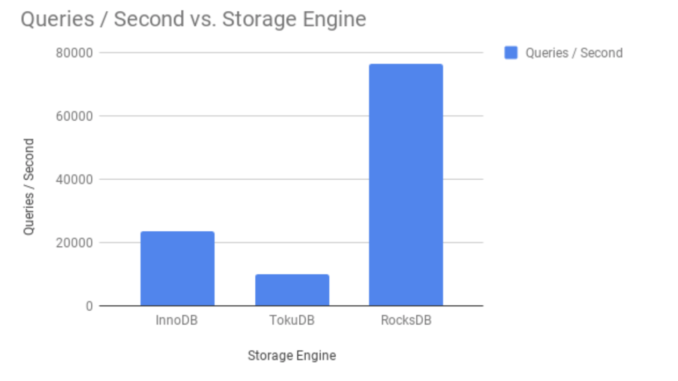
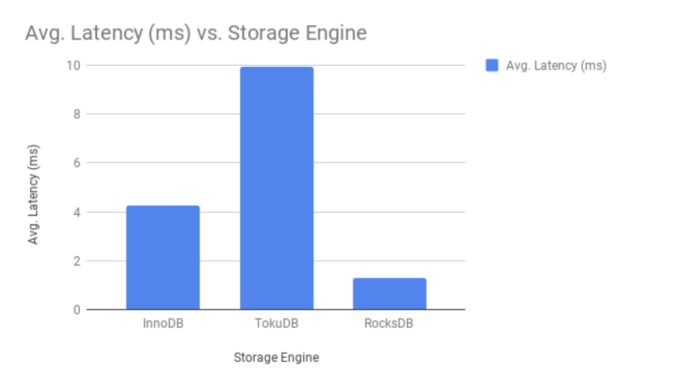
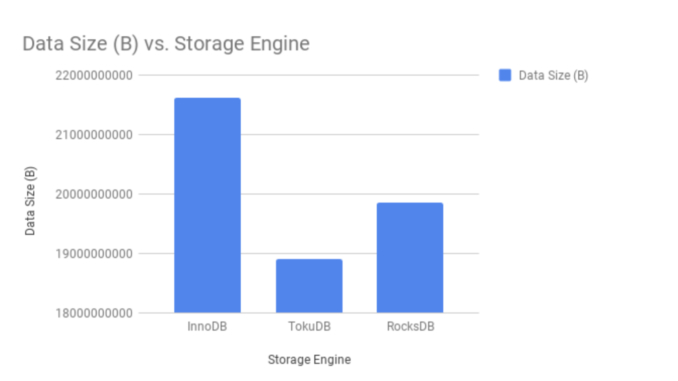
Benchmarking OLTP READ-ONLY transactions performance on TokuDB, RocksDB and InnoDB
Benchmarking READ-ONLY OLTP transactions (100M records using oltp_read_only.lua) on TokuDB:
root@blr1p01-pfm-008:/usr/share/sysbench# sysbench oltp_read_only.lua --threads=100 --time=1800 --table-size=100000000 --db-driver=mysql --mysql-db=test --mysql-socket=/var/run/mysqld/mysqld.sock --mysql-storage-engine=tokudb --mysql-user=root --mysql-password=USEYOURPASSWORD prepare
Step 2- Confirm TokuDB schema is available with 100M records:
mysql> show table status like 'sbtest1%'\G;
*************************** 1. row ***************************
Name: sbtest1
Engine: TokuDB
Version: 10
Row_format: tokudb_zlib
Rows: 100000000
Avg_row_length: 189
Data_length: 18900000000
Max_data_length: 9223372036854775807
Index_length: 860426496
Data_free: 18446744065835135232
Auto_increment: 100000001
Create_time: 2018-08-05 12:53:50
Update_time: 2018-08-05 13:13:38
Check_time: NULL
Collation: latin1_swedish_ci
Checksum: NULL
Create_options:
Comment:
1 row in set (0.00 sec)
ERROR:
No query specified
Step 3 – Benchmarking TokuDB OLTP READ-ONLY transaction performance:
root@blr1p01-pfm-008:/usr/share/sysbench# sysbench oltp_read_only.lua --threads=100 --time=1800 --table-size=100000000 --db-driver=mysql --mysql-db=test --mysql-socket=/var/run/mysqld/mysqld.sock --mysql-storage-engine=tokudb --mysql-user=root --mysql-password=USEYOURPASSWORD run
sysbench 1.0.15 (using bundled LuaJIT 2.1.0-beta2)
Running the test with following options:
Number of threads: 100
Initializing random number generator from current time
Initializing worker threads...
Threads started!
SQL statistics:
queries performed:
read: 231960820
write: 0
other: 33137260
total: 265098080
transactions: 16568630 (9204.59 per sec.)
queries: 265098080 (147273.50 per sec.)
ignored errors: 0 (0.00 per sec.)
reconnects: 0 (0.00 per sec.)
General statistics:
total time: 1800.0348s
total number of events: 16568630
Latency (ms):
min: 1.71
avg: 10.86
max: 51.11
95th percentile: 13.22
sum: 179951191.99
Threads fairness:
events (avg/stddev): 165686.3000/481.89
execution time (avg/stddev): 1799.5119/0.01
Interpreting results
QPS (Queries per second) – 147273.50
Average latency (ms) – 10.86
Benchmarking READ-ONLY OLTP transactions on RocksDB
Step 1- Build data(100M records using oltp_read_only.lua) for benchmarking:
root@blr1p01-pfm-008:/usr/share/sysbench# sysbench oltp_read_only.lua --threads=100 --time=1800 --table-size=100000000 --db-driver=mysql --mysql-db=test --mysql-socket=/var/run/mysqld/mysqld.sock --mysql-storage-engine=rocksdb --mysql-user=root --mysql-password=USEYOURPASSWORD prepare
Step 2- Confirm RocksDB schema is available with 100M records:
mysql> show table status like 'sbtest%'\G;
*************************** 1. row ***************************
Name: sbtest1
Engine: ROCKSDB
Version: 10
Row_format: Fixed
Rows: 100000000
Avg_row_length: 198
Data_length: 19855730417
Max_data_length: 0
Index_length: 750521333
Data_free: 0
Auto_increment: 100000001
Create_time: NULL
Update_time: NULL
Check_time: NULL
Collation: latin1_swedish_ci
Checksum: NULL
Create_options:
Comment:
1 row in set (0.00 sec)
ERROR:
No query specified
Step 3 – Benchmarking RocksDB OLTP READ-ONLY transaction performance:
root@blr1p01-pfm-008:/usr/share/sysbench# sysbench oltp_read_only.lua --threads=100 --time=1800 --table-size=100000000 --db-driver=mysql --mysql-db=test --mysql-socket=/var/run/mysqld/mysqld.sock --mysql-storage-engine=rocksdb --mysql-user=root --mysql-password=USEYOURPASSWORD run
sysbench 1.0.15 (using bundled LuaJIT 2.1.0-beta2)
Running the test with following options:
Number of threads: 100
Initializing random number generator from current time
Initializing worker threads...
Threads started!
SQL statistics:
queries performed:
read: 494461100
write: 0
other: 70637300
total: 565098400
transactions: 35318650 (19621.05 per sec.)
queries: 565098400 (313936.76 per sec.)
ignored errors: 0 (0.00 per sec.)
reconnects: 0 (0.00 per sec.)
General statistics:
total time: 1800.0349s
total number of events: 35318650
Latency (ms):
min: 1.80
avg: 5.09
max: 323.58
95th percentile: 7.70
sum: 179898262.01
Threads fairness:
events (avg/stddev): 353186.5000/2619.22
execution time (avg/stddev): 1798.9826/0.02
Interpreting results
QPS (Queries per second) – 313936.76
Average latency (ms) – 5.09
Benchmarking READ-ONLY OLTP transactions on InnoDB
Step 1: Build data (100M records using oltp_read_only.lua) for benchmarking:
root@blr1p01-pfm-008:/usr/share/sysbench# sysbench oltp_read_only.lua --threads=100 --time=1800 --table-size=100000000 --db-driver=mysql --mysql-db=test --mysql-socket=/var/run/mysqld/mysqld.sock --mysql-user=root --mysql-password=USEYOURPASSWORD prepare
Step 2 – Step 2- Confirm InnoDB schema is available with 100M records:
mysql> show table status like 'sbtest1'\G;
*************************** 1. row ***************************
Name: sbtest1
Engine: InnoDB
Version: 10
Row_format: Dynamic
Rows: 98650703
Avg_row_length: 224
Data_length: 22126002176
Max_data_length: 0
Index_length: 0
Data_free: 3145728
Auto_increment: 100000001
Create_time: 2018-08-05 17:20:48
Update_time: 2018-08-05 17:18:19
Check_time: NULL
Collation: latin1_swedish_ci
Checksum: NULL
Create_options:
Comment:
1 row in set (0.00 sec)
ERROR:
No query specified
Step 3 – Benchmarking InnoDB OLTP READ-ONLY transaction performance:
root@blr1p01-pfm-008:/usr/share/sysbench# sysbench oltp_read_only.lua --threads=100 --time=1800 --table-size=100000000 --db-driver=mysql --mysql-db=test --mysql-socket=/var/run/mysqld/mysqld.sock --mysql-user=root --mysql-password=USEYOURPASSWORD run
sysbench 1.0.15 (using bundled LuaJIT 2.1.0-beta2)
Running the test with following options:
Number of threads: 100
Initializing random number generator from current time
Initializing worker threads...
Threads started!
SQL statistics:
queries performed:
read: 251061874
write: 0
other: 35865982
total: 286927856
transactions: 17932991 (9962.59 per sec.)
queries: 286927856 (159401.44 per sec.)
ignored errors: 0 (0.00 per sec.)
reconnects: 0 (0.00 per sec.)
General statistics:
total time: 1800.0300s
total number of events: 17932991
Latency (ms):
min: 1.66
avg: 10.03
max: 1478.79
95th percentile: 33.12
sum: 179947481.25
Threads fairness:
events (avg/stddev): 179329.9100/1283.20
execution time (avg/stddev): 1799.4748/0.01
Interpreting results
QPS (Queries per second) – 159401.44
Average latency (ms) – 10.03
Graphical representation of OLTP READ-ONLY transactions performance in TokuDB, RocksDB and InnoDB:
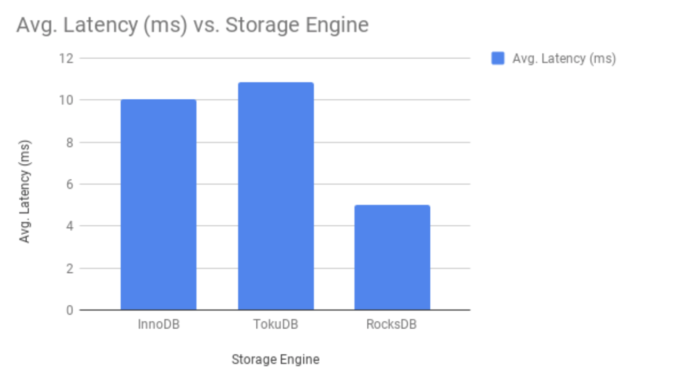
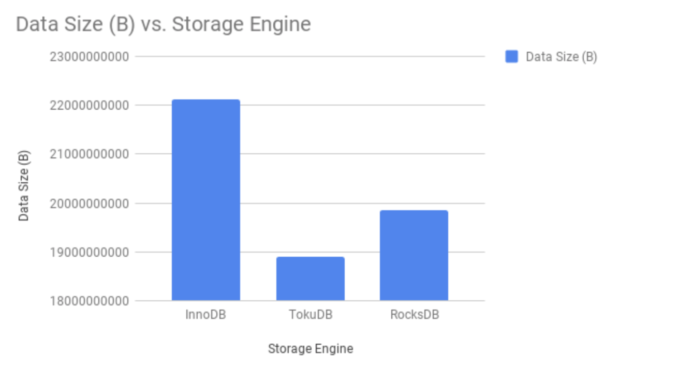
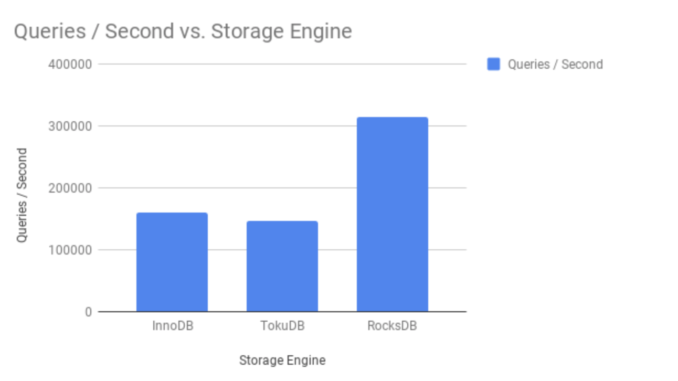
Benchmarking OLTP READ-WRITE transactions performance on TokuDB, RocksDB and InnoDB
Benchmarking READ-WRITE OLTP transactions on TokuDB
Step 1: Build data (100M records using oltp_read_write.lua) for benchmarking:
root@blr1p01-pfm-008:/usr/share/sysbench# sysbench oltp_read_write.lua --threads=100 --time=1800 --table-size=100000000 --db-driver=mysql --mysql-db=test --mysql-socket=/var/run/mysqld/mysqld.sock --mysql-storage-engine=tokudb --mysql-user=root --mysql-password=USEYOURPASSWORD prepare
Step 2- Confirm TokuDB schema is available with 100M records:
mysql> show table status like 'sbtest1%'\G;
*************************** 1. row ***************************
Name: sbtest1
Engine: TokuDB
Version: 10
Row_format: tokudb_zlib
Rows: 100000000
Avg_row_length: 189
Data_length: 18900000000
Max_data_length: 9223372036854775807
Index_length: 860645232
Data_free: 18446744065834916496
Auto_increment: 100000001
Create_time: 2018-08-05 22:41:43
Update_time: 2018-08-05 23:01:00
Check_time: NULL
Collation: latin1_swedish_ci
Checksum: NULL
Create_options:
Comment:
1 row in set (0.00 sec)
ERROR:
No query specified
Step3 – Benchmarking OLTP READ-WRITE performance on TokuDB:
root@blr1p01-pfm-008:/usr/share/sysbench# sysbench oltp_read_write.lua --threads=100 --time=1800 --table-size=100000000 --db-driver=mysql --mysql-db=test --mysql-socket=/var/run/mysqld/mysqld.sock --mysql-storage-engine=tokudb --mysql-user=root --mysql-password=USEYOURPASSWORD run
sysbench 1.0.15 (using bundled LuaJIT 2.1.0-beta2)
Running the test with following options:
Number of threads: 100
Initializing random number generator from current time
Initializing worker threads...
Threads started!
SQL statistics:
queries performed:
read: 19844342
write: 5669812
other: 2834906
total: 28349060
transactions: 1417453 (787.44 per sec.)
queries: 28349060 (15748.86 per sec.)
ignored errors: 0 (0.00 per sec.)
reconnects: 0 (0.00 per sec.)
General statistics:
total time: 1800.0668s
total number of events: 1417453
Latency (ms):
min: 3.90
avg: 126.99
max: 426.41
95th percentile: 147.61
sum: 179997357.31
Threads fairness:
events (avg/stddev): 14174.5300/7.61
execution time (avg/stddev): 1799.9736/0.02
Interpreting results
QPS (Queries per second) – 15748.86
Average latency (ms) – 126.99
Benchmarking READ-WRITE OLTP transactions on RocksDB
Step 1: Build data (100M records using oltp_read_write.lua) for benchmarking:
root@blr1p01-pfm-008:/usr/share/sysbench# sysbench oltp_read_write.lua --threads=100 --time=1800 --table-size=100000000 --db-driver=mysql --mysql-db=test --mysql-socket=/var/run/mysqld/mysqld.sock --mysql-storage-engine=rocksdb --mysql-user=root --mysql-password=USEYOURPASSWORD prepare
Step 2- Confirm RocksDB schema is available with 100M records:
mysql> show table status like 'sbtest1%'\G;
*************************** 1. row ***************************
Name: sbtest1
Engine: ROCKSDB
Version: 10
Row_format: Fixed
Rows: 100000000
Avg_row_length: 198
Data_length: 19855694789
Max_data_length: 0
Index_length: 750521319
Data_free: 0
Auto_increment: 100000001
Create_time: NULL
Update_time: NULL
Check_time: NULL
Collation: latin1_swedish_ci
Checksum: NULL
Create_options:
Comment:
1 row in set (0.00 sec)
ERROR:
No query specified
Step3 – Benchmarking OLTP READ-WRITE performance on RocksDB:
root@blr1p01-pfm-008:/usr/share/sysbench# sysbench oltp_read_write.lua --threads=100 --time=1800 --table-size=100000000 --db-driver=mysql --mysql-db=test --mysql-socket=/var/run/mysqld/mysqld.sock --mysql-storage-engine=rocksdb --mysql-user=root --mysql-password=USEYOURPASSWORD run
sysbench 1.0.15 (using bundled LuaJIT 2.1.0-beta2)
Running the test with following options:
Number of threads: 100
Initializing random number generator from current time
Initializing worker threads...
Threads started!
SQL statistics:
queries performed:
read: 286818014
write: 81910410
other: 40961372
total: 409689796
transactions: 20474371 (11374.39 per sec.)
queries: 409689796 (227600.23 per sec.)
ignored errors: 12630 (7.02 per sec.)
reconnects: 0 (0.00 per sec.)
General statistics:
total time: 1800.0375s
total number of events: 20474371
Latency (ms):
min: 2.50
avg: 8.79
max: 402.68
95th percentile: 12.75
sum: 179935638.52
Threads fairness:
events (avg/stddev): 204743.7100/2264.14
execution time (avg/stddev): 1799.3564/0.01
Interpreting results
QPS (Queries per second) – 227600.23
Average latency (ms) – 8.79
Benchmarking READ-WRITE OLTP transactions on InnoDB
Step 1: Build data (100M records using oltp_read_write.lua) for benchmarking:
root@blr1p01-pfm-008:/usr/share/sysbench# sysbench oltp_read_write.lua --threads=100 --time=1800 --table-size=100000000 --db-driver=mysql --mysql-db=test --mysql-socket=/var/run/mysqld/mysqld.sock --mysql-user=root --mysql-password=USEYOURPASSWORD prepare
Step 2- Confirm InnoDB schema is available with 100M records:
mysql> show table status like 'sbtest1%'\G;
*************************** 1. row ***************************
Name: sbtest1
Engine: InnoDB
Version: 10
Row_format: Dynamic
Rows: 100000000
Avg_row_length: 221
Data_length: 21885878272
Max_data_length: 0
Index_length: 0
Data_free: 6291456
Auto_increment: 100000001
Create_time: 2018-08-06 10:24:54
Update_time: 2018-08-06 10:31:53
Check_time: NULL
Collation: latin1_swedish_ci
Checksum: NULL
Create_options:
Comment:
1 row in set (0.00 sec)
ERROR:
No query specified
Step3 – Benchmarking OLTP READ-WRITE performance on InnoDB:
root@blr1p01-pfm-008:/usr/share/sysbench# sysbench oltp_read_write.lua --threads=100 --time=1800 --table-size=100000000 --db-driver=mysql --mysql-db=test --mysql-socket=/var/run/mysqld/mysqld.sock --mysql-user=root --mysql-password=USEYOURPASSWORD run
sysbench 1.0.15 (using bundled LuaJIT 2.1.0-beta2)
Running the test with following options:
Number of threads: 100
Initializing random number generator from current time
Initializing worker threads...
Threads started!
SQL statistics:
queries performed:
read: 67383470
write: 19251931
other: 9626043
total: 96261444
transactions: 4812938 (2673.78 per sec.)
queries: 96261444 (53477.03 per sec.)
ignored errors: 167 (0.09 per sec.)
reconnects: 0 (0.00 per sec.)
General statistics:
total time: 1800.0491s
total number of events: 4812938
Latency (ms):
min: 2.28
avg: 37.40
max: 1177.78
95th percentile: 71.83
sum: 179981855.37
Threads fairness:
events (avg/stddev): 48129.3800/110.24
execution time (avg/stddev): 1799.8186/0.00
Interpreting results
QPS (Queries per second) – 53477.03
Average latency (ms) – 37.40
Graphical representation of OLTP READ-WRITE transactions performance in TokuDB, RocksDB and InnoDB:
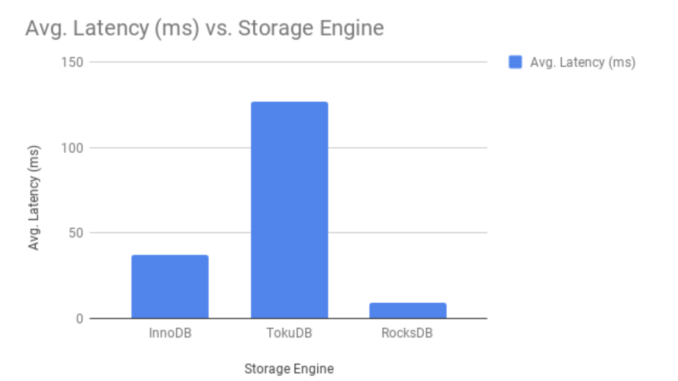
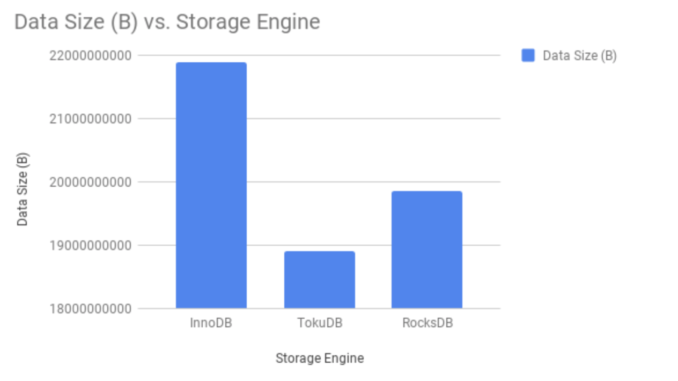
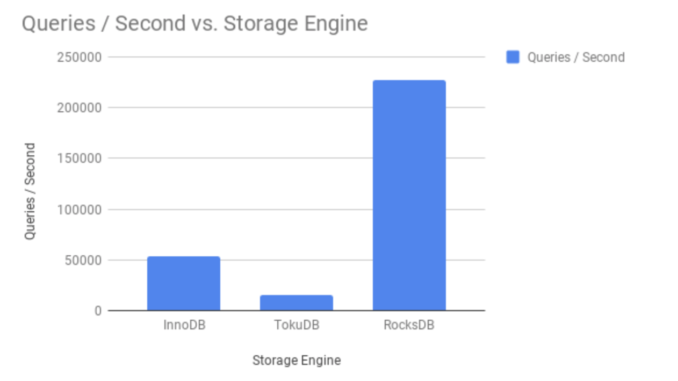
Conclusion
The results of benchmarking concluded RocksDB the most ideal candidate for SSD based storage infrastructure compared to InnoDB and TokuDB, The most compelling reasons for using RocksDB on SSD are performance, storage efficiency/compression and much smaller write amplification compared to InnoDB or TokuDB.
The post Comparing TokuDB, RocksDB and InnoDB Performance on Intel(R) Xeon(R) Gold 6140 CPU appeared first on The WebScale Database Infrastructure Operations Experts.
]]>The post Auditing MariaDB for Secured Database Infrastructure Operations appeared first on The WebScale Database Infrastructure Operations Experts.
]]>MariaDB Audit Plugin installation
The MariaDB Audit Plugin is provided as a dynamic library: server_audit.so (server_audit.dll for Windows). The file path of the plugin library is stored in the plugin_dir system variable:
MariaDB [(none)]> select @@plugin_dir; +--------------------------+ | @@plugin_dir | +--------------------------+ | /usr/lib64/mysql/plugin/ | +--------------------------+ 1 row in set (0.000 sec)
One way to install this plug-in is to execute the INSTALL SONAME statement while logged into MariaDB. You must use an administrative account with INSERT privilege for the mysql.plugin table:
MariaDB [(none)]> INSTALL SONAME 'server_audit';
Loading Plugin at Start-Up
You can also load the plugin from the command-line as a startup parameter by configuring my.cnf or my.ini in /etc/my.cnf or /etc/mysql/my.cnf , We have copied below the configuration of my.cnf for enabling MariaDB Audit Plugin (please add these variables after [mysqld] or [mariadb] ):
plugin_load=server_audit=server_audit.so server_audit_events=CONNECT,QUERY,TABLE server_audit_logging=ON server_audit=FORCE_PLUS_PERMANENT
We don’t want somebody uninstall MariaDB Audit Plugin so enabled system variable, server_audit=FORCE_PLUS_PERMANENT , The example below explains this scenario much better:
MariaDB [(none)]> UNINSTALL PLUGIN server_audit; ERROR 1702 (HY000): Plugin 'server_audit' is force_plus_permanent and can not be unloaded
To see the list of audit plugin-related variables in your MariaDB server, execute the command below:
MariaDB [(none)]> SHOW GLOBAL VARIABLES LIKE 'server_audit%'; +-------------------------------+-----------------------+ | Variable_name | Value | +-------------------------------+-----------------------+ | server_audit_events | CONNECT,QUERY,TABLE | | server_audit_excl_users | | | server_audit_file_path | server_audit.log | | server_audit_file_rotate_now | OFF | | server_audit_file_rotate_size | 1000000 | | server_audit_file_rotations | 9 | | server_audit_incl_users | | | server_audit_logging | ON | | server_audit_mode | 0 | | server_audit_output_type | file | | server_audit_query_log_limit | 1024 | | server_audit_syslog_facility | LOG_USER | | server_audit_syslog_ident | mysql-server_auditing | | server_audit_syslog_info | | | server_audit_syslog_priority | LOG_INFO | +-------------------------------+-----------------------+ 15 rows in set (0.002 sec)
Uncontrolled MariaDB Audit Plugins are major concerns in any MariaDB database infrastructure operations, I strongly recommend our customers to consider log rotate “server_audit.log” file, You can force a rotation by enabling the server_audit_file_rotate_now :
MariaDB [(none)]> SET GLOBAL server_audit_file_rotate_now = ON; Query OK, 0 rows affected (0.015 sec)
You can configure the size limit of MariaDB Audit Plugin by setting variable, server_audit_file_rotate_size . To limit the number of log files created, set the variable, server_audit_file_rotations. To force log file rotations you can set the variable, server_audit_file_rotate_now to ON:
[mariadb] .. server_audit_file_rotate_now=ON server_audit_file_rotate_size=1000000 server_audit_file_rotations=10 ...
MariaDB Audit Plugin report:
[root@localhost mysql]# tail -f server_audit.log 20180720 20:39:22,localhost.localdomain,root,localhost,13,1501,QUERY,,'SELECT DATABASE()',0 20180720 20:39:22,localhost.localdomain,root,localhost,13,1503,QUERY,sakila,'show databases',0 20180720 20:39:22,localhost.localdomain,root,localhost,13,1504,QUERY,sakila,'show tables',0 20180720 20:39:27,localhost.localdomain,root,localhost,13,1528,QUERY,sakila,'show tables',0 20180720 20:39:43,localhost.localdomain,root,localhost,13,1529,READ,sakila,customer, 20180720 20:39:43,localhost.localdomain,root,localhost,13,1529,QUERY,sakila,'select * from customer limit 100',0 20180720 20:39:52,localhost.localdomain,root,localhost,13,1530,QUERY,sakila,'show tables',0 20180720 20:40:07,localhost.localdomain,root,localhost,13,1531,READ,sakila,actor, 20180720 20:40:07,localhost.localdomain,root,localhost,13,1531,QUERY,sakila,'select * from actor limit 100',0 20180720 20:40:30,localhost.localdomain,root,localhost,13,0,DISCONNECT,sakila,,0
Conclusion
We recommend most of our customers (using MariaDB) to enable MariaDB Audit Plugin to closely monitor what is happening to their database infrastructure, This really helps to proactively troubleshoot if anything going wrong with their MariaDB operations. Reliable and secured database operations is equally important like performance and scalability.
The post Auditing MariaDB for Secured Database Infrastructure Operations appeared first on The WebScale Database Infrastructure Operations Experts.
]]>The post MySQL 8.0 Data Dictionary appeared first on The WebScale Database Infrastructure Operations Experts.
]]>How file based metadata management used to work in the past (before MySQL 8.0) ?
- Every table in MySQL will have corresponding .frm file, This .frm file stores information like column names and data-types in the binary format, In addition to the .frm file, there are .trn, .trg and .par files to support triggers, trigger namespace and partitioning .
What are major bottlenecks faced due to the usage of file based metadata management ?
- Operationally it always appeared very irrational, Why we need to have an separate mechanism to track the schema information ? Originally this was the idea from Drizzle – Drizzle made it very clear (almost ) that it should get out of the way and let the storage engines be the storage engines and not try to second guess them or keep track of things behind their back.
- Dictionaries out of synch.– Before MySQL 8.0, the data dictionary is a “split brain”, where the “server” and InnoDB have their own separate data dictionary, where some information duplicated. Information that is duplicated in the MySQL server dictionary and the InnoDB dictionary might get out of synch, and we need one common “source of truth” for dictionary information.
- INFORMATION_SCHEMA is the bottleneck– The main reason behind these performance issues in the INFORMATION_SCHEMA (before MySQL 8.0) implementation is that INFORMATION_SCHEMA tables are implemented as temporary tables that are created on-the-fly during query execution. For a MySQL server having hundreds of databases, each with hundreds of tables within them, the INFORMATION_SCHEMA query would end-up doing lot of I/O reading each individual FRM files from the file system. And it would also end-up using more CPU cycles in effort to open the table and prepare related in-memory data structures. It does attempt to use the MySQL server table cache (the system variable ‘table_definition_cache‘), however in large server instances it’s very rare to have a table cache that is large enough to accommodate all of these tables.
- No atomic DDL– Storing the data dictionary in non-transactional tables and files, means that DDLs are unsafe for replication (they are not transactional, not even atomic). If a compound DDL fails we still need to replicate it and hope that it fails with the same error. This is a best effort approach and there is a lot of logic coded to handle this . It is hard to maintain, slows down progress and bloats the replication codebase. The data dictionary is stored partly in non-transactional tables. These are not safe for replication building resilient HA systems on top of MySQL. For instance, some dictionary tables need to be manipulated using regular DML, which causes problems for GTIDs.
- Crash recovery. Since the DDL statements are not atomic, it is challenging to recover after crashing in the middle of a DDL execution, and is especially problematic for replication.
How things are changed with MySQL 8.0 ?
MySQL 8.0 introduced a native data dictionary based on InnoDB. This change has enabled us to get rid of file-based metadata store (FRM files) and also help MySQL to move towards supporting transactional DDL. We have now the metadata of all database tables stored in transactional data dictionary tables, it enables us to design an INFORMATION_SCHEMA table as a database VIEW over the data dictionary tables. This eliminates costs such as the creation of temporary tables for each INFORMATION_SCHEMA query during execution on-the-fly, and also scanning file-system directories to find FRM files. It is also now possible to utilize the full power of the MySQL optimizer to prepare better query execution plans using indexes on data dictionary tables. INFORMATION SCHEMA is now implemented as views over dictionary tables, requires no extra disc accesses, no creation of temporary tables, and is subject to similar handling of character sets and collations as user tables.
The following diagram (Source: MySQL server team blog) explains the difference in design in MySQL 5.7 and 8.0 :
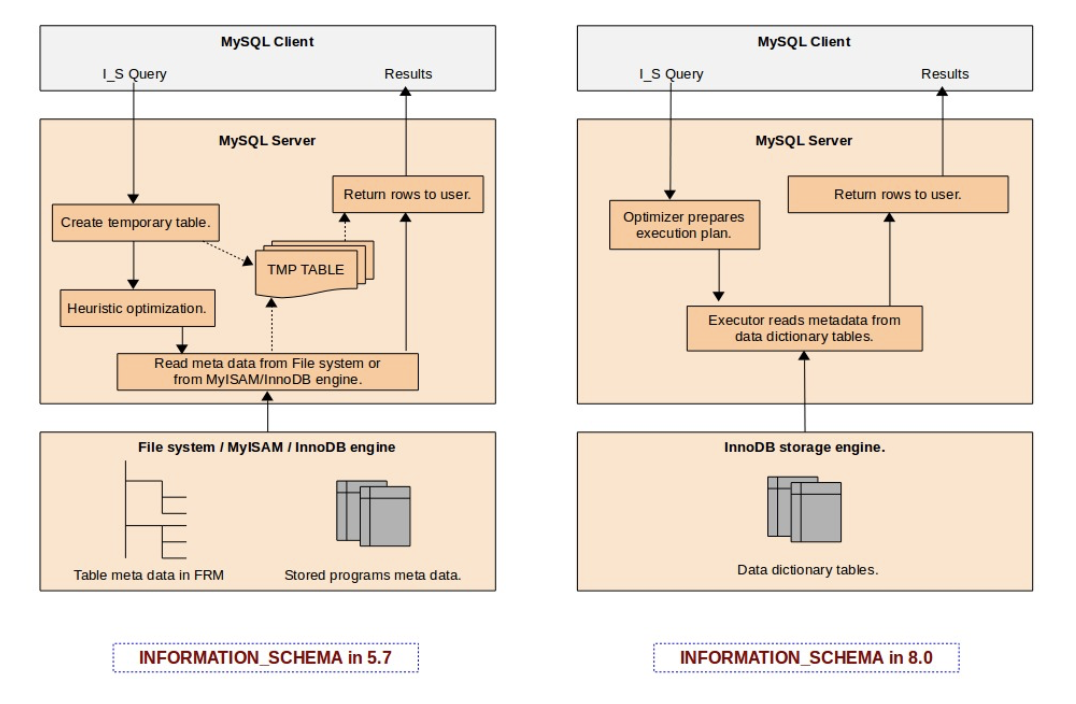
The post MySQL 8.0 Data Dictionary appeared first on The WebScale Database Infrastructure Operations Experts.
]]>The post A friendly comparison of InnoDB and MyRocks Performance appeared first on The WebScale Database Infrastructure Operations Experts.
]]>How InnoDB and MyRocks are different ?
- MyRocks supports only READ-COMMITTED isolation level, There is no REPEATABLE-READ isolation level like InnoDB so no gap locking like InnoDB, We have written detailed blog on InnoDB transaction isolation levels here
- To get an verbose information about MyRocks instance, the log is located in ” /var/lib/mysql/#rocksdb ” . Much more detailed story about your RocksDB diagnostics report can be generated with the command SHOW ENGINE ROCKSDB STATUS , It really takes good amount of time to understand and interpret MyRocks operations matrices.
- In MyRocks, you have rocksdb_block_cache_size system variable which is somewhat similar to innodb_buffer_pool_size but It’s mainly beneficial for reads. By default it uses buffered reads and OS cache contains cached compressed data and RockDB block cache will contain uncompressed data. You can have two levels of cache or disable buffering by forcing block cache to use direct reads with configuration rocksdb_use_direct_reads=ON.
- LSM Data Structure – MyRocks is not an alternative or advanced version of InnoDB, LSM data structure is great for write-intensive database operations, reads will be slow and full table scans are too expensive. so InnoDB and RocksDB together makes an great combination !
Benchmarking InnoDB and MyRocks performance with sysbench 1.0.14 for OLTP operations
Linux – CentOS Linux release 7.3.1611 (Core)
Database infrastructure – MariaDB 10.3.7
Building database infrastructure for benchmarking
We have used “oltp_common.lua” script to create database infrastructure for benchmarking InnoDB and MyRocks, We have not tuned both InnoDB and MyRocks variables for performance. The script below creates database for benchmarking:
[root@localhost sysbench]# [root@localhost sysbench]# sysbench bulk_insert.lua --threads=1 --db-driver=mysql --mysql-db=test --mysql-socket=/var/lib/mysql/mysql.sock --mysql-user=root --mysql-password=MyPassword2018 --mysql-storage-engine=rocksdb prepare sysbench 1.0.14 (using bundled LuaJIT 2.1.0-beta2) Creating table 'sbtest1'... [root@localhost sysbench]#
Benchmarking bulk INSERT performance on InnoDB and MyRocks
Benchmarking OLTP insert on InnoDB using “oltp_insert.lua”
Script to create data (5M records) for benchmarking OLTP INSERT performance:
[root@localhost sysbench]# sysbench oltp_insert.lua --threads=100 --time=180 --table-size=5000000 --db-driver=mysql --mysql-db=test --mysql-socket=/var/lib/mysql/mysql.sock --mysql-user=root --mysql-password=MyPassword2018 prepare sysbench 1.0.14 (using bundled LuaJIT 2.1.0-beta2) Initializing worker threads... Creating table 'sbtest1'... Inserting 5000000 records into 'sbtest1' Creating a secondary index on 'sbtest1'... [root@localhost sysbench]#
MariaDB [test]> show table status like 'sbtest1'\G;
*************************** 1. row ***************************
Name: sbtest1
Engine: InnoDB
Version: 10
Row_format: Dynamic
Rows: 5404891
Avg_row_length: 265
Data_length: 1433403392
Max_data_length: 0
Index_length: 157024256
Data_free: 4194304
Auto_increment: 5696281
Create_time: 2018-06-03 12:48:12
Update_time: 2018-06-03 12:52:03
Check_time: NULL
Collation: latin1_swedish_ci
Checksum: NULL
Create_options:
Comment:
Max_index_length: 0
Temporary: N
1 row in set (0.000 sec)
ERROR: No query specified
MariaDB [test]>
Script for benchmarking InnoDB OLTP INSERT performance:
[root@localhost sysbench]# sysbench oltp_insert.lua --threads=100 --time=180 --table-size=5000000 --db-driver=mysql --mysql-db=test --mysql-socket=/var/lib/mysql/mysql.sock --mysql-user=root --mysql-password=MyPassword2018 run
sysbench 1.0.14 (using bundled LuaJIT 2.1.0-beta2)
Running the test with following options:
Number of threads: 100
Initializing random number generator from current time
Initializing worker threads...
Threads started!
SQL statistics:
queries performed:
read: 0
write: 696280
other: 0
total: 696280
transactions: 696280 (3866.32 per sec.)
queries: 696280 (3866.32 per sec.)
ignored errors: 0 (0.00 per sec.)
reconnects: 0 (0.00 per sec.)
General statistics:
total time: 180.0872s
total number of events: 696280
Latency (ms):
min: 0.62
avg: 25.85
max: 358.63
95th percentile: 81.48
sum: 17998504.11
Threads fairness:
events (avg/stddev): 6962.8000/57.61
execution time (avg/stddev): 179.9850/0.04
What we look for seriously in this benchmarking is QPS (queries per seconds) , In the test above it is 3866 QPS
Benchmarking MyRocks INSERT performance using Sysbench 1.0.14:
The steps are same, except for explicitly mentioning the storage engine RocksDB in sysbench scripts: “–mysql-storage-engine=rocksdb”
Script for benchmarking OLTP insert on MyRocks using “oltp_insert.lua” :
[root@localhost sysbench]# sysbench oltp_insert.lua --threads=100 --time=180 --table-size=5000000 --db-driver=mysql --mysql-db=test --mysql-socket=/var/lib/mysql/mysql.sock --mysql-user=root --mysql-password=MyPassword2018 --mysql-storage-engine=rocksdb prepare sysbench 1.0.14 (using bundled LuaJIT 2.1.0-beta2) Initializing worker threads... Creating table 'sbtest1'... Inserting 5000000 records into 'sbtest1' Creating a secondary index on 'sbtest1'... [root@localhost sysbench]#
MariaDB [test]> show table status like 'sbtest1%'\G;
*************************** 1. row ***************************
Name: sbtest1
Engine: ROCKSDB
Version: 10
Row_format: Fixed
Rows: 5000000
Avg_row_length: 198
Data_length: 992949774
Max_data_length: 0
Index_length: 38739880
Data_free: 0
Auto_increment: 5000001
Create_time: NULL
Update_time: NULL
Check_time: NULL
Collation: latin1_swedish_ci
Checksum: NULL
Create_options:
Comment:
Max_index_length: 0
Temporary: N
1 row in set (0.007 sec)
ERROR: No query specified
MariaDB [test]>
Script for benchmarking RocksDB OLTP INSERT performance:
[root@localhost sysbench]# sysbench oltp_insert.lua --threads=100 --time=180 --table-size=5000000 --db-driver=mysql --mysql-db=test --mysql-socket=/var/lib/mysql/mysql.sock --mysql-user=root --mysql-password=MyPassword2018 --mysql-storage-engine=rocksdb run
sysbench 1.0.14 (using bundled LuaJIT 2.1.0-beta2)
Running the test with following options:
Number of threads: 100
Initializing random number generator from current time
Initializing worker threads...
Threads started!
SQL statistics:
queries performed:
read: 0
write: 123049
other: 0
total: 123049
transactions: 123049 (683.37 per sec.)
queries: 123049 (683.37 per sec.)
ignored errors: 0 (0.00 per sec.)
reconnects: 0 (0.00 per sec.)
General statistics:
total time: 180.0618s
total number of events: 123049
Latency (ms):
min: 1.03
avg: 146.30
max: 1675.09
95th percentile: 308.84
sum: 18001689.44
Threads fairness:
events (avg/stddev): 1230.4900/26.26
execution time (avg/stddev): 180.0169/0.02
[root@localhost sysbench]#
Result: OLTP INSERT performance for RocksDB is 683 QPS (queries per second)
The graphical representation of more interesting performance benchmarking results on multiple bulk INSERT transactions scenarios:
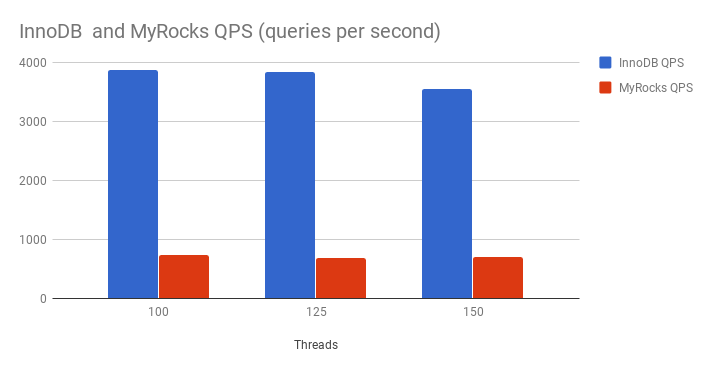
Conclusion
OLTP INSERT performance benchmarking clearly proves InnoDB is almost 6X faster than MyRocks. So MyRocks is not recommended for bulk INSERT transactions !
OLTP WRITE only transactions performance benchmarking for InnoDB and MyRocks
OLTP WRITE only performance benchmarking for InnoDB using “oltp_write_only.lua”
The steps remains same for “oltp_write_only.lua” script like “oltp_insert.lua” mentioned above, So we are directly copying the results of benchmarking without explaining details again:
[root@localhost sysbench]# sysbench oltp_write_only.lua --threads=100 --table-size=5000000 --db-driver=mysql --mysql-db=test --mysql-socket=/var/lib/mysql/mysql.sock --mysql-user=root --mysql-password=MyPassword2018 prepare sysbench 1.0.14 (using bundled LuaJIT 2.1.0-beta2) Initializing worker threads... Creating table 'sbtest1'... Inserting 5000000 records into 'sbtest1' Creating a secondary index on 'sbtest1'...
[root@localhost sysbench]# sysbench oltp_write_only.lua --threads=100 --table-size=5000000 --db-driver=mysql --mysql-db=test --mysql-socket=/var/lib/mysql/mysql.sock --mysql-user=root --mysql-password=MyPassword2018 run
sysbench 1.0.14 (using bundled LuaJIT 2.1.0-beta2)
Running the test with following options:
Number of threads: 100
Initializing random number generator from current time
Initializing worker threads...
Threads started!
SQL statistics:
queries performed:
read: 0
write: 14529
other: 7265
total: 21794
transactions: 3632 (355.03 per sec.)
queries: 21794 (2130.37 per sec.)
ignored errors: 1 (0.10 per sec.)
reconnects: 0 (0.00 per sec.)
General statistics:
total time: 10.2285s
total number of events: 3632
Latency (ms):
min: 1.88
avg: 277.61
max: 2701.56
95th percentile: 977.74
sum: 1008267.12
Threads fairness:
events (avg/stddev): 36.3200/4.36
execution time (avg/stddev): 10.0827/0.09
Result : 2130 QPS (queries per second)
OLTP WRITE only performance benchmarking for RocksDB using “oltp_write_only.lua”
[root@localhost sysbench]# sysbench oltp_write_only.lua --threads=100 --table-size=5000000 --db-driver=mysql --mysql-db=test --mysql-socket=/var/lib/mysql/mysql.sock --mysql-user=root --mysql-password=MyPassword2018 --mysql-storage-engine=rocksdb prepare sysbench 1.0.14 (using bundled LuaJIT 2.1.0-beta2) Initializing worker threads... Creating table 'sbtest1'... Inserting 5000000 records into 'sbtest1' Creating a secondary index on 'sbtest1'...
[root@localhost sysbench]# sysbench oltp_write_only.lua --threads=100 --table-size=5000000 --db-driver=mysql --mysql-db=test --mysql-socket=/var/lib/mysql/mysql.sock --mysql-user=root --mysql-password=MyPassword2018 --mysql-storage-engine=rocksdb run
sysbench 1.0.14 (using bundled LuaJIT 2.1.0-beta2)
Running the test with following options:
Number of threads: 100
Initializing random number generator from current time
Initializing worker threads...
Threads started!
SQL statistics:
queries performed:
read: 0
write: 25191
other: 12596
total: 37787
transactions: 6296 (625.73 per sec.)
queries: 37787 (3755.49 per sec.)
ignored errors: 4 (0.40 per sec.)
reconnects: 0 (0.00 per sec.)
General statistics:
total time: 10.0603s
total number of events: 6296
Latency (ms):
min: 1.39
avg: 159.29
max: 3620.58
95th percentile: 846.57
sum: 1002895.84
Threads fairness:
events (avg/stddev): 62.9600/25.26
execution time (avg/stddev): 10.0290/0.02
Result : 3755 QPS (queries per second)
The graphical representation of more interesting performance benchmarking results on multiple WRITE only transactions scenarios:
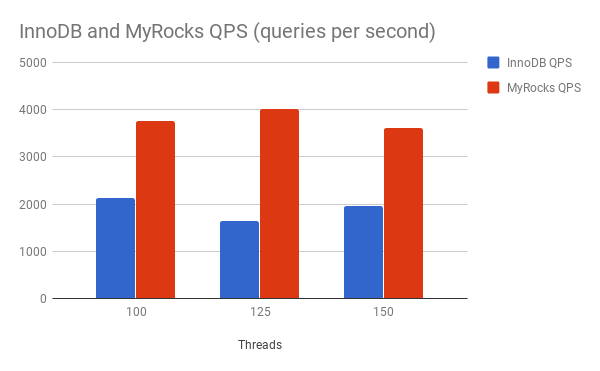
Conclusion
MyRocks OLTP write only performance is almost 2X compared to InnoDB, So MyRocks is definitely an preferred option for high performance and scalable writes, Thanks to LSM data structure !
OLTP READ-WRITE performance benchmarking using Sysbench lua script “oltp_read_write.lua”
The lua scripts below create data for OLTP READ-WRITE performance benchmarking:
Benchmarking OLTP READ-WRITE performance for InnoDB:
[root@localhost sysbench]# sysbench oltp_read_write.lua --threads=100 --table-size=5000000 --db-driver=mysql --mysql-db=test --mysql-socket=/var/lib/mysql/mysql.sock --mysql-user=root --mysql-password=MyPassword2018 prepare sysbench 1.0.14 (using bundled LuaJIT 2.1.0-beta2) Initializing worker threads... Creating table 'sbtest1'... Inserting 5000000 records into 'sbtest1' Creating a secondary index on 'sbtest1'...
[root@localhost sysbench]# sysbench oltp_read_write.lua --threads=100 --table-size=5000000 --db-driver=mysql --mysql-db=test --mysql-socket=/var/lib/mysql/mysql.sock --mysql-user=root --mysql-password=MyPassword2018 run
sysbench 1.0.14 (using bundled LuaJIT 2.1.0-beta2)
Running the test with following options:
Number of threads: 100
Initializing random number generator from current time
Initializing worker threads...
Threads started!
SQL statistics:
queries performed:
read: 15652
write: 4472
other: 2236
total: 22360
transactions: 1118 (105.96 per sec.)
queries: 22360 (2119.20 per sec.)
ignored errors: 0 (0.00 per sec.)
reconnects: 0 (0.00 per sec.)
General statistics:
total time: 10.5301s
total number of events: 1118
Latency (ms):
min: 15.71
avg: 922.19
max: 4973.09
95th percentile: 2009.23
sum: 1031006.57
Threads fairness:
events (avg/stddev): 11.1800/1.68
execution time (avg/stddev): 10.3101/0.13
[root@localhost sysbench]#
Result: 2119 QPS (queries per second)
Benchmarking OLTP READ-WRITE performance for RocksDB:
[root@localhost sysbench]# sysbench oltp_read_write.lua --threads=100 --table-size=5000000 --db-driver=mysql --mysql-db=test --mysql-socket=/var/lib/mysql/mysql.sock --mysql-user=root --mysql-password=MyPassword2018 --mysql-storage-engine=rocksdb prepare sysbench 1.0.14 (using bundled LuaJIT 2.1.0-beta2) Initializing worker threads... Creating table 'sbtest1'... Inserting 5000000 records into 'sbtest1' Creating a secondary index on 'sbtest1'...
[root@localhost sysbench]# sysbench oltp_read_write.lua --threads=100 --table-size=5000000 --db-driver=mysql --mysql-db=test --mysql-socket=/var/lib/mysql/mysql.sock --mysql-user=root --mysql-password=MyPassword2018 --mysql-storage-engine=rocksdb run
sysbench 1.0.14 (using bundled LuaJIT 2.1.0-beta2)
Running the test with following options:
Number of threads: 100
Initializing random number generator from current time
Initializing worker threads...
Threads started!
SQL statistics:
queries performed:
read: 26964
write: 7628
other: 3827
total: 38419
transactions: 1901 (182.46 per sec.)
queries: 38419 (3687.46 per sec.)
ignored errors: 25 (2.40 per sec.)
reconnects: 0 (0.00 per sec.)
General statistics:
total time: 10.4153s
total number of events: 1901
Latency (ms):
min: 11.23
avg: 540.87
max: 3480.91
95th percentile: 1352.03
sum: 1028196.02
Threads fairness:
events (avg/stddev): 19.0100/2.25
execution time (avg/stddev): 10.2820/0.10
[root@localhost sysbench]#
Result: 3687 QPS (queries per second)
The graphical representation of more interesting performance benchmarking results on multiple READ-WRITE transactions scenarios:
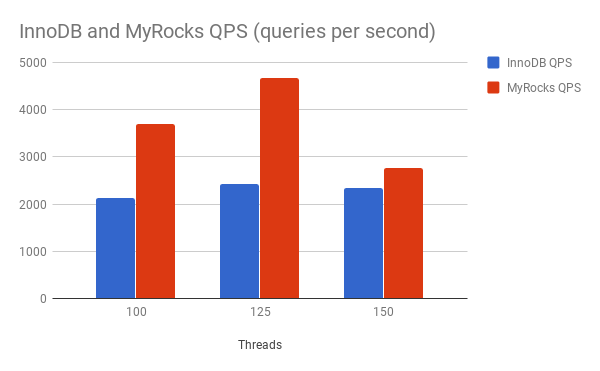
Conclusion
OLTP READ-WRITE I/O operations benchmarking results confirm MyRocks is the definite choice, May be these result vary more if we invest in tuning the InnoDB and MyRocks for performance.
Benchmarking OLTP READ ONLY operations using Sysbench oltp_read_only.lua script
OLTP READ ONLY transactions performance benchmarking for InnoDB:
[root@localhost sysbench]# sysbench oltp_read_only.lua --threads=100 --table-size=5000000 --db-driver=mysql --mysql-db=test --mysql-socket=/var/lib/mysql/mysql.sock --mysql-user=root --mysql-password=MyPassword2018 prepare sysbench 1.0.14 (using bundled LuaJIT 2.1.0-beta2) Initializing worker threads... Creating table 'sbtest1'... Inserting 5000000 records into 'sbtest1' Creating a secondary index on 'sbtest1'...
[root@localhost sysbench]# sysbench oltp_read_only.lua --threads=100 --table-size=5000000 --db-driver=mysql --mysql-db=test --mysql-socket=/var/lib/mysql/mysql.sock --mysql-user=root --mysql-password=MyPassword2018 run
sysbench 1.0.14 (using bundled LuaJIT 2.1.0-beta2)
Running the test with following options:
Number of threads: 100
Initializing random number generator from current time
Initializing worker threads...
Threads started!
SQL statistics:
queries performed:
read: 51072
write: 0
other: 7296
total: 58368
transactions: 3648 (352.59 per sec.)
queries: 58368 (5641.45 per sec.)
ignored errors: 0 (0.00 per sec.)
reconnects: 0 (0.00 per sec.)
General statistics:
total time: 10.3436s
total number of events: 3648
Latency (ms):
min: 1.10
avg: 274.41
max: 2863.46
95th percentile: 733.00
sum: 1001047.53
Threads fairness:
events (avg/stddev): 36.4800/6.57
execution time (avg/stddev): 10.0105/0.05
Result: 5641 QPS (queries per second)
OLTP READ ONLY transactions performance benchmarking for RocksDB:
[root@localhost sysbench]# sysbench oltp_read_only.lua --threads=100 --table-size=5000000 --db-driver=mysql --mysql-db=test --mysql-socket=/var/lib/mysql/mysql.sock --mysql-user=root --mysql-password=MyPassword2018 --mysql-storage-engine=rocksdb prepare sysbench 1.0.14 (using bundled LuaJIT 2.1.0-beta2) Initializing worker threads... Creating table 'sbtest1'... Inserting 5000000 records into 'sbtest1' Creating a secondary index on 'sbtest1'...
[root@localhost sysbench]# sysbench oltp_read_only.lua --threads=100 --table-size=5000000 --db-driver=mysql --mysql-db=test --mysql-socket=/var/lib/mysql/mysql.sock --mysql-user=root --mysql-password=MyPassword2018 --mysql-storage-engine=rocksdb run
sysbench 1.0.14 (using bundled LuaJIT 2.1.0-beta2)
Running the test with following options:
Number of threads: 100
Initializing random number generator from current time
Initializing worker threads...
Threads started!
SQL statistics:
queries performed:
read: 26362
write: 0
other: 3766
total: 30128
transactions: 1883 (182.77 per sec.)
queries: 30128 (2924.32 per sec.)
ignored errors: 0 (0.00 per sec.)
reconnects: 0 (0.00 per sec.)
General statistics:
total time: 10.2983s
total number of events: 1883
Latency (ms):
min: 6.20
avg: 540.16
max: 5258.04
95th percentile: 2045.74
sum: 1017118.10
Threads fairness:
events (avg/stddev): 18.8300/2.29
execution time (avg/stddev): 10.1712/0.08
Result: 2924 QPS (queries per second)
The graphical representation of more interesting performance benchmarking results on multiple READ only transactions scenarios:
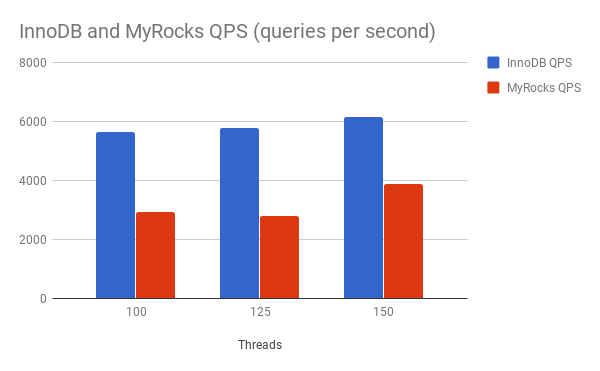
Conclusion
InnoDB works great if it is OLTP READ only transactions, So we can continue recommending customers to use InnoDB for read intensive database operations.
Benchmarking OLTP DELETE ONLY operations using Sysbench oltp_delete.lua script
OLTP DELETE ONLY transactions performance benchmarking for InnoDB:
[root@localhost sysbench]# sysbench oltp_delete.lua --threads=100 --table-size=5000000 --db-driver=mysql --mysql-db=test --mysql-socket=/var/lib/mysql/mysql.sock --mysql-user=root --mysql-password=MyPassword2018 prepare sysbench 1.0.14 (using bundled LuaJIT 2.1.0-beta2) Initializing worker threads... Creating table 'sbtest1'... Inserting 5000000 records into 'sbtest1' Creating a secondary index on 'sbtest1'...
[root@localhost sysbench]# sysbench oltp_delete.lua --threads=100 --table-size=5000000 --db-driver=mysql --mysql-db=test --mysql-socket=/var/lib/mysql/mysql.sock --mysql-user=root --mysql-password=MyPassword2018 run
sysbench 1.0.14 (using bundled LuaJIT 2.1.0-beta2)
Running the test with following options:
Number of threads: 100
Initializing random number generator from current time
Initializing worker threads...
Threads started!
SQL statistics:
queries performed:
read: 0
write: 21659
other: 4464
total: 26123
transactions: 26123 (2521.93 per sec.)
queries: 26123 (2521.93 per sec.)
ignored errors: 0 (0.00 per sec.)
reconnects: 0 (0.00 per sec.)
General statistics:
total time: 10.3568s
total number of events: 26123
Latency (ms):
min: 0.04
avg: 38.08
max: 2679.06
95th percentile: 116.80
sum: 994654.43
Threads fairness:
events (avg/stddev): 261.2300/46.27
execution time (avg/stddev): 9.9465/0.18
[root@localhost sysbench]#
Result: 2521 QPS (queries per second)
OLTP DELETE ONLY transactions performance benchmarking for RocksDB:
[root@localhost sysbench]# sysbench oltp_delete.lua --threads=100 --table-size=5000000 --db-driver=mysql --mysql-db=test --mysql-socket=/var/lib/mysql/mysql.sock --mysql-user=root --mysql-password=MyPassword2018 --mysql-storage-engine=rocksdb prepare sysbench 1.0.14 (using bundled LuaJIT 2.1.0-beta2) Initializing worker threads... Creating table 'sbtest1'... Inserting 5000000 records into 'sbtest1' Creating a secondary index on 'sbtest1'...
[root@localhost sysbench]# sysbench oltp_delete.lua --threads=100 --table-size=5000000 --db-driver=mysql --mysql-db=test --mysql-socket=/var/lib/mysql/mysql.sock --mysql-user=root --mysql-password=MyPassword2018 --mysql-storage-engine=rocksdb run
sysbench 1.0.14 (using bundled LuaJIT 2.1.0-beta2)
Running the test with following options:
Number of threads: 100
Initializing random number generator from current time
Initializing worker threads...
Threads started!
SQL statistics:
queries performed:
read: 0
write: 7094
other: 421
total: 7515
transactions: 7515 (746.81 per sec.)
queries: 7515 (746.81 per sec.)
ignored errors: 0 (0.00 per sec.)
reconnects: 0 (0.00 per sec.)
General statistics:
total time: 10.0613s
total number of events: 7515
Latency (ms):
min: 0.43
avg: 133.42
max: 1666.25
95th percentile: 502.20
sum: 1002663.49
Threads fairness:
events (avg/stddev): 75.1500/15.50
execution time (avg/stddev): 10.0266/0.02
Result: 746 QPS (queries per second)
The graphical representation of more interesting performance benchmarking results on multiple DELETE only transactions scenarios:
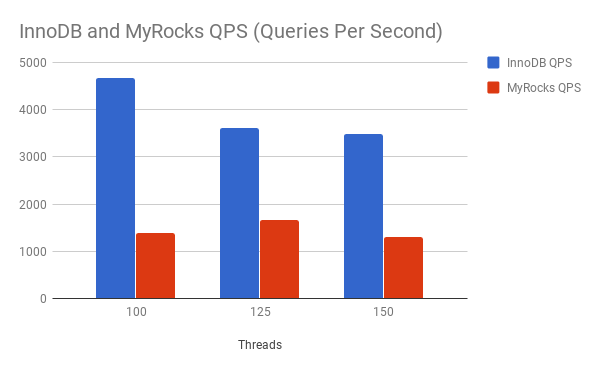
Conclusion
InnoDB is almost 3X faster than MyRocks in OLTP DELETE operations.
InnoDB and MyRocks performance comparison :
- InnoDB is the definite choice if the transaction model is bulk INSERT, READ and DELETE intensive database operations.
- MyRocks performance is much better than InnoDB in WRITE and READ-WRITE intensive database operations.
The post A friendly comparison of InnoDB and MyRocks Performance appeared first on The WebScale Database Infrastructure Operations Experts.
]]>The post MySQL 8 default character set is utf8mb4 appeared first on The WebScale Database Infrastructure Operations Experts.
]]>The UTF-8 is a variable-length encoding. In the case of UTF-8, it means that storing one code point requires one to four bytes. But, In MySQL’s encoding called “utf8” only stores a maximum of three bytes per code point. In the modern web / mobile applications, we have to support for storing not only language characters but also symbols and emojis, Let me show you below some very weird issues faced using MySQL “utf8” :
mysql> SET NAMES utf8; # just to emphasize that the connection charset is set to `utf8` Query OK, 0 rows affected (0.00 sec) mysql> UPDATE custfeeds.reactions SET reacted = 'super like' WHERE id = 13015; Query OK, 1 row affected, 1 warning (0.00 sec) Rows matched: 1 Changed: 1 Warnings: 1 mysql> SELECT reactions FROM custfeeds.reactions WHERE id = 13015; +-------------+ | reactions | +-------------+ | super liked | +-------------+ 1 row in set (0.00 sec) mysql> SHOW WARNINGS; +---------+------+------------------------------------------------------------------------------+ | Level | Code | Message | +---------+------+------------------------------------------------------------------------------+ | Warning | 1366 | Incorrect string value: '\xF0\x9D\x8C\x86' for column 'reactions' at row 731 | +---------+------+------------------------------------------------------------------------------+ 1 row in set (0.00 sec)
MySQL’s utf8 charset can only store UTF-8-encoded symbols that consist of one to three bytes; encoded symbols that take up four bytes aren’t supported. MySQL 5.5.3 released utf8mb4 encoding to solve this problem (https://dev.mysql.com/doc/relnotes/mysql/5.5/en/news-5-5-3.html) so utf8mb4 charset is not a MySQL 8 new feature (yes, It’s now default charset from MySQL8)
MySQL 8 has by default utf8mb4 character set
mysql> SHOW VARIABLES WHERE Variable_name LIKE 'character\_set\_%' OR Variable_name LIKE 'collation%'; +--------------------------+--------------------+ | Variable_name | Value | +--------------------------+--------------------+ | character_set_client | utf8mb4 | | character_set_connection | utf8mb4 | | character_set_database | utf8mb4 | | character_set_filesystem | binary | | character_set_results | utf8mb4 | | character_set_server | utf8mb4 | | character_set_system | utf8 | | collation_connection | utf8mb4_0900_ai_ci | | collation_database | utf8mb4_0900_ai_ci | | collation_server | utf8mb4_0900_ai_ci | +--------------------------+--------------------+ 10 rows in set (0.01 sec)
How things changed in MySQL 8 with utf8mb4 character set ?
mysql> UPDATE custfeeds.reactions SET reacted = 'super like' WHERE id = 13015; Query OK, 1 row affected, 0 warning (0.00 sec) Rows matched: 1 Changed: 1 Warnings: 0
mysql> SELECT reactions FROM custfeeds.reactions WHERE id = 13015; +-------------+ | reactions | +-------------+ | super liked| +-------------+ 1 row in set (0.00 sec)
Conclusion
Traditionally MySQL is built for scaling web-scale database infrastructure operations, In the modern web applications / mobile apps. , emojis and a multitude of charsets / collation needs to coexist. To address this compelling need, in MySQL 8.0 default character set has been changed from latin-1 to utf8mb4.
The post MySQL 8 default character set is utf8mb4 appeared first on The WebScale Database Infrastructure Operations Experts.
]]>The post MySQL 8 invisible indexes appeared first on The WebScale Database Infrastructure Operations Experts.
]]>Why we really love invisible indexes in MySQL 8.0?
- You want to make only one query to use that index, In this case “invisible index” is a great option
- On-demand indexing, You will have index (up-to-date with data) but you can make it visible or invisible. Even when optimizer force index, invisible indexes will not be invoked.
- Testing which index is efficient for many queries, You can test them by enabling invisible index and do not forget to disable them before testing with another invisible index, You can test index efficiency in production system (instant gratification indeed !)
How can you create MySQL invisible indexes?
There are two ways you can create invisible indexes:
Step1 is quite direct.
CREATE TABLE tab1 ( col1 int(10) DEFAULT NULL, col2 int(10) DEFAULT NULL, col3 int(10) DEFAULT NULL, KEY i_idx (col1), KEY idx_1 (col1,col2,col3) INVISIBLE ) ENGINE=InnoDB DEFAULT CHARSET=latin1
Step 2 is with “alter table script”
mysql> alter table tab1 alter index idx_1 invisible; Query OK, 0 rows affected (0.06 sec) Records: 0 Duplicates: 0 Warnings: 0
Using invisible index
mysql> show create table tab1 \G;
*************************** 1. row ***************************
Table: tab1
Create Table: CREATE TABLE `tab1` (
`col1` int(10) DEFAULT NULL,
`col2` int(10) DEFAULT NULL,
`col3` int(10) DEFAULT NULL,
KEY `i_idx` (`col1`),
KEY `idx_1` (`col1`,`col2`,`col3`) /*!80000 INVISIBLE */
) ENGINE=InnoDB DEFAULT CHARSET=latin1
1 row in set (0.01 sec)
Now, Let see we can forcefully make optimizer use the invisible index (here it is – idx_1)
mysql> explain select * from tab1 force index (idx_1) where col1=20 and col2=30; ERROR 1176 (42000): Key 'idx_1' doesn't exist in table 'tab1'
Let’s try, How we can forcibly make optimizer use the index i_idx (this works because index is not invisible)
mysql> explain select * from tab1 force index (i_idx) where col1=20 and col2=30; +----+-------------+-------+------------+------+---------------+-------+---------+-------+------+----------+-------------+ | id | select_type | table | partitions | type | possible_keys | key | key_len | ref | rows | filtered | Extra | +----+-------------+-------+------------+------+---------------+-------+---------+-------+------+----------+-------------+ | 1 | SIMPLE | tab1 | NULL | ref | i_idx | i_idx | 5 | const | 1 | 33.33 | Using where | +----+-------------+-------+------------+------+---------------+-------+---------+-------+------+----------+-------------+ 1 row in set, 1 warning (0.00 sec)
We are converting the index “idx_1” visible to make optimizer forcibly use
mysql> alter table tab1 alter index idx_1 visible; Query OK, 0 rows affected (0.05 sec) Records: 0 Duplicates: 0 Warnings: 0
mysql> explain select * from tab1 force index (idx_1) where col1=20 and col2=30; +----+-------------+-------+------------+------+---------------+-------+---------+-------------+------+----------+-------------+ | id | select_type | table | partitions | type | possible_keys | key | key_len | ref | rows | filtered | Extra | +----+-------------+-------+------------+------+---------------+-------+---------+-------------+------+----------+-------------+ | 1 | SIMPLE | tab1 | NULL | ref | idx_1 | idx_1 | 10 | const,const | 1 | 100.00 | Using index | +----+-------------+-------+------------+------+---------------+-------+---------+-------------+------+----------+-------------+ 1 row in set, 1 warning (0.00 sec) mysql>
We cannot alter Primary Key to invisible index:
mysql> create table tab3
-> (col11 int(10) not null,
-> col22 int(10) not null,
-> col33 int(10) not null,
-> unique uidx(col11));
Query OK, 0 rows affected (0.10 sec)
mysql> alter table tab3 alter index uidx invisible;
ERROR 3522 (HY000): A primary key index cannot be invisible
mysql>
Conclusion
MySQL 8.0 invisible index is an very interesting feature, This enables Database Architects / DBAs / Database Engineers to choose optimal indexing for MySQL performance and scalability. We are very excited about this feature, This makes several of our customer applications more optimal..
MySQL 8 invisible indexes (MySQL official documentation) – https://dev.mysql.com/doc/refman/8.0/en/invisible-indexes.html
The post MySQL 8 invisible indexes appeared first on The WebScale Database Infrastructure Operations Experts.
]]>The post Benchmarking CPU, Memory, file I/O and mutex performance using Sysbench appeared first on The WebScale Database Infrastructure Operations Experts.
]]>Benchmarking CPU using Sysbench
This benchmark is configured with the number of simultaneous threads and the maximum number to verify if it is a prime.
[root@localhost shiv]# sysbench --test=cpu --cpu-max-prime=2000000 --num-threads=120 run
Running the test with following options:
Number of threads: 120
Initializing random number generator from current time
Prime numbers limit: 2000000
Initializing worker threads...
Threads started!
CPU speed:
events per second: 0.69
Throughput:
events/s (eps): 0.6891
time elapsed: 174.1418s
total number of events: 120
Latency (ms):
min: 169807.71
avg: 172640.02
max: 174120.65
95th percentile: 100000.00
sum: 20716802.25
Threads fairness:
events (avg/stddev): 1.0000/0.00
execution time (avg/stddev): 172.6400/0.83
[root@localhost shiv]# sysbench --test=threads --thread-locks=10 --max-time=60 run
sysbench 1.1.0-651e7fd (using bundled LuaJIT 2.1.0-beta3)
Running the test with following options:
Number of threads: 1
Initializing random number generator from current time
Initializing worker threads...
Threads started!
Throughput:
events/s (eps): 2366.0725
time elapsed: 60.0003s
total number of events: 141965
Latency (ms):
min: 0.38
avg: 0.42
max: 8.86
95th percentile: 0.53
sum: 59942.51
Threads fairness:
events (avg/stddev): 141965.0000/0.00
execution time (avg/stddev): 59.9425/0.00
To conclude the interpretation of thread performance benchmarking, we annotate time elapsed (actual time for the completion of the activity), in this case it “60.0003” seconds.
[root@localhost shiv]# sysbench --test=mutex --num-threads=130 run
WARNING: the --test option is deprecated. You can pass a script name or path on the command line without any options.
WARNING: --num-threads is deprecated, use --threads instead
sysbench 1.1.0-651e7fd (using bundled LuaJIT 2.1.0-beta3)
Running the test with following options:
Number of threads: 130
Initializing random number generator from current time
Initializing worker threads...
Threads started!
Throughput:
events/s (eps): 5.8047
time elapsed: 22.3956s
total number of events: 130
Latency (ms):
min: 17566.82
avg: 20789.93
max: 22230.90
95th percentile: 21641.55
sum: 2702690.46
Threads fairness:
events (avg/stddev): 1.0000/0.00
execution time (avg/stddev): 20.7899/0.82
The throughput and average latency are the two matrices we consider to interpret mutex workload performance :
Throughput:
events/s (eps): 5.8047
time elapsed: 22.3956s
Latency (ms):
min: 17566.82
avg: 20789.93
max: 22230.90
95th percentile: 21641.55
sum: 2702690.46
Benchmarking the memory workload
When we use sysbench to benchmark memory, sysbench allocate a memory buffer and then read or write from/on it, each time for the size of a pointer (32 bit or 64 bit) and until the total buffer size has been read from or written to. This activity will be continued till the provided volume (–memory-total-size) is reached. The load can be increased or reduced by providing multiple threads (–num-threads), size of buffer (–memory-block-size) and request type (read / write / sequential / random)
[root@localhost shiv]# sysbench --test=memory --num-threads=140 --memory-total-size=10G run
sysbench 1.1.0-651e7fd (using bundled LuaJIT 2.1.0-beta3)
Running the test with following options:
Number of threads: 140
Initializing random number generator from current time
Running memory speed test with the following options:
block size: 1KiB
total size: 10240MiB
operation: write
scope: global
Initializing worker threads...
Threads started!
Total operations: 10485720 (3351958.44 per second)
10239.96 MiB transferred (3273.40 MiB/sec)
Throughput:
events/s (eps): 3351958.4393
time elapsed: 3.1282s
total number of events: 10485720
Latency (ms):
min: 0.00
avg: 0.01
max: 2931.98
95th percentile: 0.00
sum: 123371.54
Threads fairness:
events (avg/stddev): 74898.0000/0.00
execution time (avg/stddev): 0.8812/0.93
Throughput and operations per second are the important matrices to measure for memory workload benchmarking :
Total operations: 10485720 (3351958.44 per second) 10239.96 MiB transferred (3273.40 MiB/sec)
Benchmarking file system I/O with Sysbench
You can use multiple scenarios for benchmarking file system I/O but here we have used rndrw (combined random read / write) for more complex I/O and production similar I/O operations, This happens in three steps explained below:
- Prepare – Creates the files for testing
- Run – Performs the benchmarking and reporting
- Cleanup – Clean the system by deleting the files
Prepare
[root@localhost shiv]# sysbench --num-threads=16 --test=fileio --file-total-size=10G --file-test-mode=rndrw prepare sysbench 1.1.0-651e7fd (using bundled LuaJIT 2.1.0-beta3) 128 files, 81920Kb each, 10240Mb total Creating files for the test... Extra file open flags: (none) Reusing existing file test_file.0 Reusing existing file test_file.1 Reusing existing file test_file.2 Reusing existing file test_file.3 .................................. .................................. Reusing existing file test_file.122 Reusing existing file test_file.123 Reusing existing file test_file.124 Reusing existing file test_file.125 Reusing existing file test_file.126 Reusing existing file test_file.127
Run
[root@localhost shiv]# sysbench --num-threads=16 --test=fileio --file-total-size=10G --file-test-mode=rndrw run
sysbench 1.1.0-651e7fd (using bundled LuaJIT 2.1.0-beta3)
Running the test with following options:
Number of threads: 16
Initializing random number generator from current time
Extra file open flags: (none)
128 files, 80MiB each
10GiB total file size
Block size 16KiB
Number of IO requests: 0
Read/Write ratio for combined random IO test: 1.50
Periodic FSYNC enabled, calling fsync() each 100 requests.
Calling fsync() at the end of test, Enabled.
Using synchronous I/O mode
Doing random r/w test
Initializing worker threads...
Threads started!
Throughput:
read: IOPS=2495.85 39.00 MiB/s (40.89 MB/s)
write: IOPS=1663.70 26.00 MiB/s (27.26 MB/s)
fsync: IOPS=5311.68
Latency (ms):
min: 0.00
avg: 1.69
max: 631.90
95th percentile: 5.00
sum: 159794.48
Cleanup
[root@localhost shiv]# sysbench --num-threads=16 --test=fileio --file-total-size=10G --file-test-mode=rndrw cleanup WARNING: the --test option is deprecated. You can pass a script name or path on the command line without any options. WARNING: --num-threads is deprecated, use --threads instead sysbench 1.1.0-651e7fd (using bundled LuaJIT 2.1.0-beta3) Removing test files...
In the file system I/O benchmarking, We spend time annotating and interpreting only throughput (both reads and writes) under varying loads, Here in the test above read throughput is 40.89 MB/s and the write throughput is 27.26 MB/s
The post Benchmarking CPU, Memory, file I/O and mutex performance using Sysbench appeared first on The WebScale Database Infrastructure Operations Experts.
]]>The post InnoDB Disk I/O Performance appeared first on The WebScale Database Infrastructure Operations Experts.
]]>- Confirm it’s not CPU – Check CPU usage, if the workload is more than 90% then bottleneck is also CPU
- Innodb_buffer_pool_size – If table data is cached in the InnoDB buffer pool, it can be accessed repeatedly by queries without requiring any disk I/O. You can specify the size of the buffer pool with system variable innodb_buffer_pool_size. The typically recommended value for innodb_buffer_pool_size is 70 to 80 percent of available system memory but need not to be larger than the database size.
- Optimal flush method – Default InnoDB flush method is fsync() ; In some versions of GNU/Linux and Unix, This makes write performance unacceptably slow. We encourage you to benchmark the write performance by setting system variable innodb_flush_method to O_DSYNC .
- Tuning the I/O capacity for performance – Increase the innodb_io_capacity only if you find throughput is affected, Higher values causes more frequent flushing, avoiding the backlog of work that can cause dips in throughput. You can consider reducing innodb_io_capacity by monitoring InnoDB throughput from the following matrices of SHOW ENGINE INNODB STATUS command :
-
- History list length low, below a few thousand
- Insert buffer merges close to rows inserted.
- Modified pages in buffer pool consistently well below innodb_max_dirty_pages_pct of the buffer pool. (Measure at a time when the server is not doing bulk inserts; it is normal during bulk inserts for the modified pages percentage to rise significantly.)
- Log sequence number – Last checkpoint is at less than 7/8 or ideally less than 6/8 of the total size of the InnoDB log files.
- Invest in non-rotational storage – Random I/O operations perform optimally in Non-rotational storage. Random I/O oriented files include general data files (both tables and indexes) , undo tablespace files and temporary tablespace files.
-
- Review settings for the following configuration options when using non-rotational storage:
- Innodb_checksum_algorithm – The crc32 option uses a faster checksum algorithm and is recommended for fast storage systems.
- Innodb_flush_neighbors – This option optimizes I/O for rotational storage devices. Disable it for non-rotational storage or a mix of rotational and non-rotational storage.
- Innodb_io_capacity – The default setting of 200 is generally sufficient for a lower-end non-rotational storage device. For higher-end, bus-attached devices, consider a higher setting such as 1000.
- Innodb_io_capacity_max – The default value of 2000 is intended for workloads that use non-rotational storage. For a high-end, bus-attached non-rotational storage device, consider a higher setting such as 2500.
- Innodb_log_compressed_pages – If redo logs are on non-rotational storage, consider disabling this option to reduce logging.
- Innodb_log_file_size – If redo logs are on non-rotational storage, configure this option to maximize caching and write combining.
- Innodb_page_size – Consider using a page size that matches the internal sector size of the disk. Early-generation SSD devices often have a 4k sector size. Some newer devices have a 16k sector size. The default InnoDB page size is 16k. Keeping the page size close to the storage device block size minimizes the amount of unchanged data that is rewritten to disk.
- Binlog_row_image – If binary logs are on non-rotational storage and all tables have primary keys, consider setting this option to minimal to reduce logging.
- Review settings for the following configuration options when using non-rotational storage:
- Store system tablespace files on Fusion-io devices – To get the advantage of doublewrite buffer-related I/O optimization, you can store system tablespace files (“ibdata files”) on Fusion-io devices that support atomic writes. In this case, doublewrite buffering (innodb_doublewrite) is automatically disabled and Fusion-io atomic writes are used for all data files. This feature is only supported on Fusion-io hardware and is only enabled for Fusion-io NVMFS on Linux. To take full advantage of this feature, an innodb_flush_method setting of O_DIRECT is recommended.
- Disable logging of compressed pages – If you are using InnoDB table compression feature, images of re-compressed pages are written to the redo log when changes are made to compressed data. This behaviour is controlled by innodb_log_controlled pages, which is enabled by default to prevent corruption that can occur if a different version of zlib compression algorithm is used during recovery. Once confirmed that zlib version will not change, you can disable innodb_log_compressed pages to reduce redo log generation for workloads that modify compressed data.
The post InnoDB Disk I/O Performance appeared first on The WebScale Database Infrastructure Operations Experts.
]]>The post Benchmarking MySQL 5.7 using Sysbench 1.1 appeared first on The WebScale Database Infrastructure Operations Experts.
]]>CPU – How long it takes for CPU to compute maximum primary number ? You may as well add how many threads are participating in this benchmarking process . This is very direct and easy way to benchmark the CPU performance.
File I/O – Benchmarking disk I/O performance considering all possible scenarios like direct io, sync, async etc. testing sequential reads / writes and random reads / writes , This makes an very scalable disk I/O benchmarking possible.
OLTP – Benchmarking MySQL under all possible workloads, like SELECT only queries (random / sequential SELECT) , INSERT / UPDATE / DELETE operations on multiple use case scenarios like bulk data loading, range-based updates, high volume data deletes (both random and sequential) etc. There is no MySQL benchmarking complete without Sysbench
Installing Sysbench
There are several ways to install Sysbench, It’s very well documented here – https://github.com/akopytov/sysbench#linux so we are not repeating it here again but we personally prefer installing Sysbench from source for many reasons so I have shared my method of installing Sysbench on CentOS
Git clone Sysbench :
[root@localhost Sysbench]# git clone https://github.com/akopytov/sysbench.git Cloning into 'sysbench'... remote: Counting objects: 8891, done. remote: Total 8891 (delta 0), reused 0 (delta 0), pack-reused 8891 Receiving objects: 100% (8891/8891), 3.88 MiB | 1.47 MiB/s, done. Resolving deltas: 100% (6320/6320), done.
[root@localhost sysbench]# ls COPYING Makefile.am README-WIN.txt autogen.sh configure.ac install-sh missing rpm snap tests ChangeLog README-Oracle.md README.md config debian m4 mkinstalldirs scripts src
Build Requirements (we use CentOS 7.3)
[root@localhost sysbench]# yum -y install make automake libtool pkgconfig libaio-devel Verifying : glibc-2.17-157.el7.x86_64 21/23 Verifying : libgomp-4.8.5-11.el7.x86_64 22/23 Verifying : glibc-common-2.17-157.el7.x86_64 23/23 Installed: automake.noarch 0:1.13.4-3.el7 libaio-devel.x86_64 0:0.3.109-13.el7 libtool.x86_64 0:2.4.2-22.el7_3 Dependency Installed: autoconf.noarch 0:2.69-11.el7 cpp.x86_64 0:4.8.5-16.el7_4.2 gcc.x86_64 0:4.8.5-16.el7_4.2 glibc-devel.x86_64 0:2.17-196.el7_4.2 glibc-headers.x86_64 0:2.17-196.el7_4.2 kernel-headers.x86_64 0:3.10.0-693.21.1.el7 libmpc.x86_64 0:1.0.1-3.el7 m4.x86_64 0:1.4.16-10.el7 mpfr.x86_64 0:3.1.1-4.el7 perl-Data-Dumper.x86_64 0:2.145-3.el7 perl-Test-Harness.noarch 0:3.28-3.el7 perl-Thread-Queue.noarch 0:3.02-2.el7 Dependency Updated: glibc.x86_64 0:2.17-196.el7_4.2 glibc-common.x86_64 0:2.17-196.el7_4.2 libgcc.x86_64 0:4.8.5-16.el7_4.2 libgomp.x86_64 0:4.8.5-16.el7_4.2 Complete!
[root@localhost sysbench]# yum -y install mysql-devel Verifying : e2fsprogs-libs-1.42.9-9.el7.x86_64 34/35 Verifying : krb5-libs-1.14.1-26.el7.x86_64 35/35 Installed: mariadb-devel.x86_64 1:5.5.56-2.el7 Dependency Installed: keyutils-libs-devel.x86_64 0:1.5.8-3.el7 krb5-devel.x86_64 0:1.15.1-8.el7 libcom_err-devel.x86_64 0:1.42.9-10.el7 libkadm5.x86_64 0:1.15.1-8.el7 libselinux-devel.x86_64 0:2.5-11.el7 libsepol-devel.x86_64 0:2.5-6.el7 libverto-devel.x86_64 0:0.2.5-4.el7 openssl-devel.x86_64 1:1.0.2k-8.el7 pcre-devel.x86_64 0:8.32-17.el7 zlib-devel.x86_64 0:1.2.7-17.el7 Dependency Updated: e2fsprogs.x86_64 0:1.42.9-10.el7 e2fsprogs-libs.x86_64 0:1.42.9-10.el7 krb5-libs.x86_64 0:1.15.1-8.el7 libcom_err.x86_64 0:1.42.9-10.el7 libselinux.x86_64 0:2.5-11.el7 libselinux-python.x86_64 0:2.5-11.el7 libselinux-utils.x86_64 0:2.5-11.el7 libss.x86_64 0:1.42.9-10.el7 mariadb-libs.x86_64 1:5.5.56-2.el7 openssl.x86_64 1:1.0.2k-8.el7 openssl-libs.x86_64 1:1.0.2k-8.el7 pcre.x86_64 0:8.32-17.el7 Complete!
Install Sysbench from source
Step 1 – Run “autogen.sh”
[root@localhost sysbench]# ./autogen.sh perl: warning: Setting locale failed. perl: warning: Please check that your locale settings: LANGUAGE = (unset), LC_ALL = (unset), LC_CTYPE = "UTF-8", LANG = "en_US.UTF-8" configure.ac:59: installing 'config/ar-lib' configure.ac:45: installing 'config/compile' configure.ac:27: installing 'config/config.guess' configure.ac:27: installing 'config/config.sub' configure.ac:32: installing 'config/install-sh' configure.ac:32: installing 'config/missing' src/Makefile.am: installing 'config/depcomp' parallel-tests: installing 'config/test-driver' autoreconf: Leaving directory `.'
Step 2 – Run “configure.sh”
[root@localhost sysbench]# ls
COPYING Makefile.in README.md autom4te.cache configure.ac m4 rpm src
ChangeLog README-Oracle.md aclocal.m4 config debian missing scripts tests
Makefile.am README-WIN.txt autogen.sh configure install-sh mkinstalldirs snap third_party
[root@localhost sysbench]# ./configure
checking build system type... x86_64-unknown-linux-gnu
checking host system type... x86_64-unknown-linux-gnu
checking target system type... x86_64-unknown-linux-gnu
===============================================================================
sysbench version : 1.1.0-651e7fd
CC : gcc -std=gnu99
CFLAGS : -O3 -funroll-loops -ggdb3 -march=core2 -Wall -Wextra -Wpointer-arith -Wbad-function-cast -Wstrict-prototypes -Wnested-externs -Wno-format-zero-length -Wundef -Wstrict-prototypes -Wmissing-prototypes -Wmissing-declarations -Wredundant-decls -Wcast-align -pthread
CPPFLAGS : -D_GNU_SOURCE -I$(top_srcdir)/src -I$(abs_top_builddir)/third_party/luajit/inc -I$(abs_top_builddir)/third_party/concurrency_kit/include
LDFLAGS : -L/usr/local/lib
LIBS : -laio -lm
prefix : /usr/local
bindir : ${prefix}/bin
libexecdir : ${prefix}/libexec
mandir : ${prefix}/share/man
datadir : ${prefix}/share
MySQL support : yes
Drizzle support : no
AttachSQL support : no
Oracle support : no
PostgreSQL support : no
LuaJIT : bundled
LUAJIT_CFLAGS : -I$(abs_top_builddir)/third_party/luajit/inc
LUAJIT_LIBS : $(abs_top_builddir)/third_party/luajit/lib/libluajit-5.1.a -ldl
LUAJIT_LDFLAGS : -rdynamic
Concurrency Kit : bundled
CK_CFLAGS : -I$(abs_top_builddir)/third_party/concurrency_kit/include
CK_LIBS : $(abs_top_builddir)/third_party/concurrency_kit/lib/libck.a
configure flags :
===============================================================================
Step 3 – Make sysbench for MySQL benchmarking with Lua scripts
[root@localhost sysbench]# [root@localhost sysbench]# make -j Making all in third_party/luajit make[1]: Entering directory `/home/shiv/Sysbench/sysbench/third_party/luajit' make -C ./luajit clean make[2]: Entering directory `/home/shiv/Sysbench/sysbench/third_party/luajit/luajit' make -C src clean make[3]: Entering directory `/home/shiv/Sysbench/sysbench/third_party/luajit/luajit/src' rm -f luajit libluajit.a libluajit.so host/minilua host/buildvm lj_vm.S lj_bcdef.h lj_ffdef.h lj_libdef.h lj_recdef.h lj_folddef.h host/buildvm_arch.h jit/vmdef.lua *.o host/*.o *.obj *.lib *.exp *.dll *.exe *.manifest *.pdb *.ilk make[3]: Leaving directory `/home/shiv/Sysbench/sysbench/third_party/luajit/luajit/src' make[2]: Leaving directory `/home/shiv/Sysbench/sysbench/third_party/luajit/luajit' libtool: link: gcc -std=gnu99 -Wall -Wextra -Wpointer-arith -Wbad-function-cast -Wstrict-prototypes -Wnested-externs -Wno-format-zero-length -Wundef -Wstrict-prototypes -Wmissing-prototypes -Wmissing-declarations -Wredundant-decls -Wcast-align -pthread -O3 -funroll-loops -ggdb3 -march=core2 -rdynamic -o sysbench sysbench.o sb_timer.o sb_options.o sb_logger.o db_driver.o sb_histogram.o sb_rand.o sb_thread.o sb_barrier.o sb_lua.o sb_util.o sb_counter.o -L/usr/local/lib tests/fileio/libsbfileio.a tests/threads/libsbthreads.a tests/memory/libsbmemory.a tests/cpu/libsbcpu.a tests/mutex/libsbmutex.a drivers/mysql/libsbmysql.a -L/usr/lib64/mysql -lmysqlclient -lpthread -lz -lssl -lcrypto /home/shiv/Sysbench/sysbench/third_party/luajit/lib/libluajit-5.1.a -ldl /home/shiv/Sysbench/sysbench/third_party/concurrency_kit/lib/libck.a -laio -lm -pthread make[2]: Leaving directory `/home/shiv/Sysbench/sysbench/src' make[1]: Leaving directory `/home/shiv/Sysbench/sysbench/src' Making all in tests make[1]: Entering directory `/home/shiv/Sysbench/sysbench/tests' make[1]: Nothing to be done for `all'. make[1]: Leaving directory `/home/shiv/Sysbench/sysbench/tests' make[1]: Entering directory `/home/shiv/Sysbench/sysbench' make[1]: Nothing to be done for `all-am'. make[1]: Leaving directory `/home/shiv/Sysbench/sysbench' [root@localhost sysbench]#
[root@localhost sysbench]# make install Making install in third_party/luajit make[1]: Entering directory `/home/shiv/Sysbench/sysbench/third_party/luajit' make[2]: Entering directory `/home/shiv/Sysbench/sysbench/third_party/luajit' make[2]: Nothing to be done for `install-exec-am'. make[2]: Nothing to be done for `install-data-am'. make[2]: Leaving directory `/home/shiv/Sysbench/sysbench/third_party/luajit' make[1]: Leaving directory `/home/shiv/Sysbench/sysbench/third_party/luajit' Making install in third_party/concurrency_kit make[1]: Entering directory `/home/shiv/Sysbench/sysbench/third_party/concurrency_kit' make[2]: Entering directory `/home/shiv/Sysbench/sysbench/third_party/concurrency_kit' make[2]: Nothing to be done for `install-exec-am'. make[2]: Nothing to be done for `install-data-am'. make[2]: Leaving directory `/home/shiv/Sysbench/sysbench/third_party/concurrency_kit' make[1]: Leaving directory `/home/shiv/Sysbench/sysbench/third_party/concurrency_kit' Making install in src make[1]: Entering directory `/home/shiv/Sysbench/sysbench/src' /usr/bin/mkdir -p '/usr/local/share/sysbench/tests' /usr/bin/install -c test_run.sh '/usr/local/share/sysbench/tests' make[2]: Leaving directory `/home/shiv/Sysbench/sysbench/tests' make[1]: Leaving directory `/home/shiv/Sysbench/sysbench/tests' make[1]: Entering directory `/home/shiv/Sysbench/sysbench' make[2]: Entering directory `/home/shiv/Sysbench/sysbench' make[2]: Nothing to be done for `install-exec-am'. make[2]: Nothing to be done for `install-data-am'. make[2]: Leaving directory `/home/shiv/Sysbench/sysbench' make[1]: Leaving directory `/home/shiv/Sysbench/sysbench' [root@localhost sysbench]#
Step 4 – Confirm successful installation of Sysbench 1.1
[root@localhost sysbench]# sysbench --version sysbench 1.1.0-651e7fd [root@localhost sysbench]#
How to use Sysbench for benchmarking ?
Benchmarking CPU
Benchmarking CPU with just 1 thread , we look for time elapsed value majorly (In this case it is 10.0457s)
[root@localhost sysbench]# sysbench --test=cpu --cpu-max-prime=300000 run
sysbench 1.1.0-651e7fd (using bundled LuaJIT 2.1.0-beta3)
Running the test with following options:
Number of threads: 1
Initializing random number generator from current time
Prime numbers limit: 300000
Initializing worker threads...
Threads started!
CPU speed:
events per second: 9.85
Throughput:
events/s (eps): 9.8550
time elapsed: 10.0457s
total number of events: 99
Latency (ms):
min: 91.73
avg: 101.46
max: 179.27
95th percentile: 110.66
sum: 10044.86
Threads fairness:
events (avg/stddev): 99.0000/0.00
execution time (avg/stddev): 10.0449/0.00
[root@localhost sysbench]#
Benchmarking CPU with 60 threads (if you notice –test option is deprecated with Sysbench 1.1)
[root@localhost sysbench]# sysbench --test=cpu --cpu-max-prime=300000 --num-threads=60 run
sysbench 1.1.0-651e7fd (using bundled LuaJIT 2.1.0-beta3)
Running the test with following options:
Number of threads: 60
Initializing random number generator from current time
Prime numbers limit: 300000
Initializing worker threads...
Threads started!
CPU speed:
events per second: 9.90
Throughput:
events/s (eps): 9.9047
time elapsed: 12.1155s
total number of events: 120
Latency (ms):
min: 4802.24
avg: 5781.75
max: 6633.59
95th percentile: 6360.91
sum: 693809.67
Threads fairness:
events (avg/stddev): 2.0000/0.00
execution time (avg/stddev): 11.5635/0.28
[root@localhost sysbench]#
Benchmarking RAM / Memory (both reads and writes)
[root@localhost sysbench]# sysbench --test=memory --memory-block-size=64K --memory-scope=global --memory-total-size=300G --memory-oper=read run
sysbench 1.1.0-651e7fd (using bundled LuaJIT 2.1.0-beta3)
Running the test with following options:
Number of threads: 1
Initializing random number generator from current time
Running memory speed test with the following options:
block size: 64KiB
total size: 307200MiB
operation: read
scope: global
Initializing worker threads...
Threads started!
Total operations: 3210450 (321043.11 per second)
200653.12 MiB transferred (20065.19 MiB/sec)
Throughput:
events/s (eps): 321043.1076
time elapsed: 10.0001s
total number of events: 3210450
Latency (ms):
min: 0.00
avg: 0.00
max: 22.43
95th percentile: 0.00
sum: 9251.30
Threads fairness:
events (avg/stddev): 3210450.0000/0.00
execution time (avg/stddev): 9.2513/0.00
[root@localhost sysbench]# sysbench --test=memory --memory-block-size=64K --memory-scope=global --memory-total-size=300G --memory-oper=write run
sysbench 1.1.0-651e7fd (using bundled LuaJIT 2.1.0-beta3)
Running the test with following options:
Number of threads: 1
Initializing random number generator from current time
Running memory speed test with the following options:
block size: 64KiB
total size: 307200MiB
operation: write
scope: global
Initializing worker threads...
Threads started!
Total operations: 2378246 (237823.34 per second)
148640.38 MiB transferred (14863.96 MiB/sec)
Throughput:
events/s (eps): 237823.3394
time elapsed: 10.0001s
total number of events: 2378246
Latency (ms):
min: 0.00
avg: 0.00
max: 7.84
95th percentile: 0.00
sum: 9485.47
Threads fairness:
events (avg/stddev): 2378246.0000/0.00
execution time (avg/stddev): 9.4855/0.00
Benchmarking Disk I/O
The following I/O operations can be benchmarked using Sysbench :
- Sequential write – seqwr
- Sequential rewrite – seqrewr
- Sequential read – seqrd
- Random read – rndrd
- Random write – rndwr
- Combined random read/write – rndrw
Examples
Step 1 – Create a file , define total number of threads and file test mode. In the example below, we have selected combined random read/write (rndrw)
[root@localhost sysbench]# sysbench --num-threads=16 --test=fileio --file-total-size=2G --file-test-mode=rndrw prepare sysbench 1.1.0-651e7fd (using bundled LuaJIT 2.1.0-beta3) 128 files, 16384Kb each, 2048Mb total Creating files for the test... Extra file open flags: (none) Creating file test_file.0 Creating file test_file.1 Creating file test_file.2 Creating file test_file.3 Creating file test_file.4 Creating file test_file.5 Creating file test_file.6 Creating file test_file.7 Creating file test_file.8 Creating file test_file.9 Creating file test_file.10 Creating file test_file.11 Creating file test_file.12 Creating file test_file.13 Creating file test_file.14 Creating file test_file.15 ......... ............ Creating file test_file.125 Creating file test_file.126 Creating file test_file.127 2147483648 bytes written in 3.21 seconds (637.65 MiB/sec).
Step 2 – Run benchmarking test on file created above
[root@localhost sysbench]# sysbench --num-threads=16 --test=fileio --file-total-size=2G --file-test-mode=rndrw run
sysbench 1.1.0-651e7fd (using bundled LuaJIT 2.1.0-beta3)
128 files, 16MiB each
2GiB total file size
Block size 16KiB
Number of IO requests: 0
Read/Write ratio for combined random IO test: 1.50
Periodic FSYNC enabled, calling fsync() each 100 requests.
Calling fsync() at the end of test, Enabled.
Using synchronous I/O mode
Doing random r/w test
Initializing worker threads...
Threads started!
Throughput:
read: IOPS=2111.56 32.99 MiB/s (34.60 MB/s)
write: IOPS=1407.37 21.99 MiB/s (23.06 MB/s)
fsync: IOPS=4500.34
Latency (ms):
min: 0.00
avg: 1.99
max: 621.12
95th percentile: 4.10
sum: 159899.55
Step 3 – Remove the files once completed benchmarking
[root@localhost sysbench]# sysbench --num-threads=16 --test=fileio --file-total-size=2G --file-test-mode=rndrw cleanup sysbench 1.1.0-651e7fd (using bundled LuaJIT 2.1.0-beta3) Removing test files...
Benchmarking MySQL using custom Lua scripts available with installation of Sysbench 1.1 (/usr/local/share/sysbench)
We have custom Lua scripts available with Sysbench 1.1 for benchmarking MySQL (I have listed them below)
[root@localhost sysbench]# ls bulk_insert.lua oltp_delete.lua oltp_point_select.lua oltp_read_write.lua oltp_update_non_index.lua select_random_points.lua tests oltp_common.lua oltp_insert.lua oltp_read_only.lua oltp_update_index.lua oltp_write_only.lua select_random_ranges.lua
Step 1 – create a MySQL database for running the benchmarking tests
mysql> create database sysbench; Query OK, 1 row affected (0.00 sec)
We have chosen “select_random_points.lua” script for benchmarking MySQL 5.7(default setting) in the example below :
Step 2 – Prepare sbtest1 table in sysbench database create above with 2M records
[root@localhost sysbench]# sysbench select_random_points.lua --table-size=2000000 --num-threads=1 --rand-type=uniform --db-driver=mysql --mysql-db=sysbench --mysql-user=root --mysql-password=SriLanka/2018 prepare sysbench 1.1.0-651e7fd (using bundled LuaJIT 2.1.0-beta3) Creating table 'sbtest1'... Inserting 2000000 records into 'sbtest1' Creating a secondary index on 'sbtest1'... [root@localhost sysbench]#
mysql> show table status like 'sbtest%' \G;
*************************** 1. row ***************************
Name: sbtest1
Engine: InnoDB
Version: 10
Row_format: Dynamic
Rows: 1921969
Avg_row_length: 233
Data_length: 449724416
Max_data_length: 0
Index_length: 0
Data_free: 5242880
Auto_increment: 2000001
Create_time: 2018-03-12 23:32:13
Update_time: 2018-03-12 23:32:07
Check_time: NULL
Collation: latin1_swedish_ci
Checksum: NULL
Create_options:
Comment:
1 row in set (0.00 sec)
ERROR:
No query specified
Step 3 – Run the benchmark test using select_random_ponts.lua script , We have selected 100 threads for this test :
[root@localhost sysbench]# sysbench select_random_points.lua --table-size=2000000 --num-threads=100 --rand-type=uniform --db-driver=mysql --mysql-db=sysbench --mysql-user=root --mysql-password=SriLanka/2018 run
sysbench 1.1.0-651e7fd (using bundled LuaJIT 2.1.0-beta3)
Running the test with following options:
Number of threads: 100
Initializing random number generator from current time
Initializing worker threads...
Threads started!
SQL statistics:
queries performed:
read: 28214
write: 0
other: 0
total: 28214
transactions: 28214 (2799.30 per sec.)
queries: 28214 (2799.30 per sec.)
ignored errors: 0 (0.00 per sec.)
reconnects: 0 (0.00 per sec.)
Throughput:
events/s (eps): 2799.2957
time elapsed: 10.0790s
total number of events: 28214
Latency (ms):
min: 0.15
avg: 35.50
max: 1727.81
95th percentile: 77.19
sum: 1001542.39
Threads fairness:
events (avg/stddev): 282.1400/13.24
execution time (avg/stddev): 10.0154/0.02
In the above report, time elapsed (at MinervaDB we measure performance by response time ) is most important matrix for me, Though we consider transactions / queries per second equally to measure the load in the system
Step 4 – Please don’t not forget to cleanup MySQL database created (sysbench in this example)
[root@localhost sysbench]# sysbench select_random_points.lua --table-size=2000000 --num-threads=100 --rand-type=uniform --db-driver=mysql --mysql-db=sysbench --mysql-user=root --mysql-password=SriLanka/2018 cleanup sysbench 1.1.0-651e7fd (using bundled LuaJIT 2.1.0-beta3) Dropping table 'sbtest1'... [root@localhost sysbench]#
Conclusion
The only intention of this blog is to help you learn how to install Sysbench 1.1 and benchmark MySQL, We have not tweaked MySQL for performance and the data collected with this exercise is not for publishing MySQL 5.7 performance benchmarking results.
The post Benchmarking MySQL 5.7 using Sysbench 1.1 appeared first on The WebScale Database Infrastructure Operations Experts.
]]>